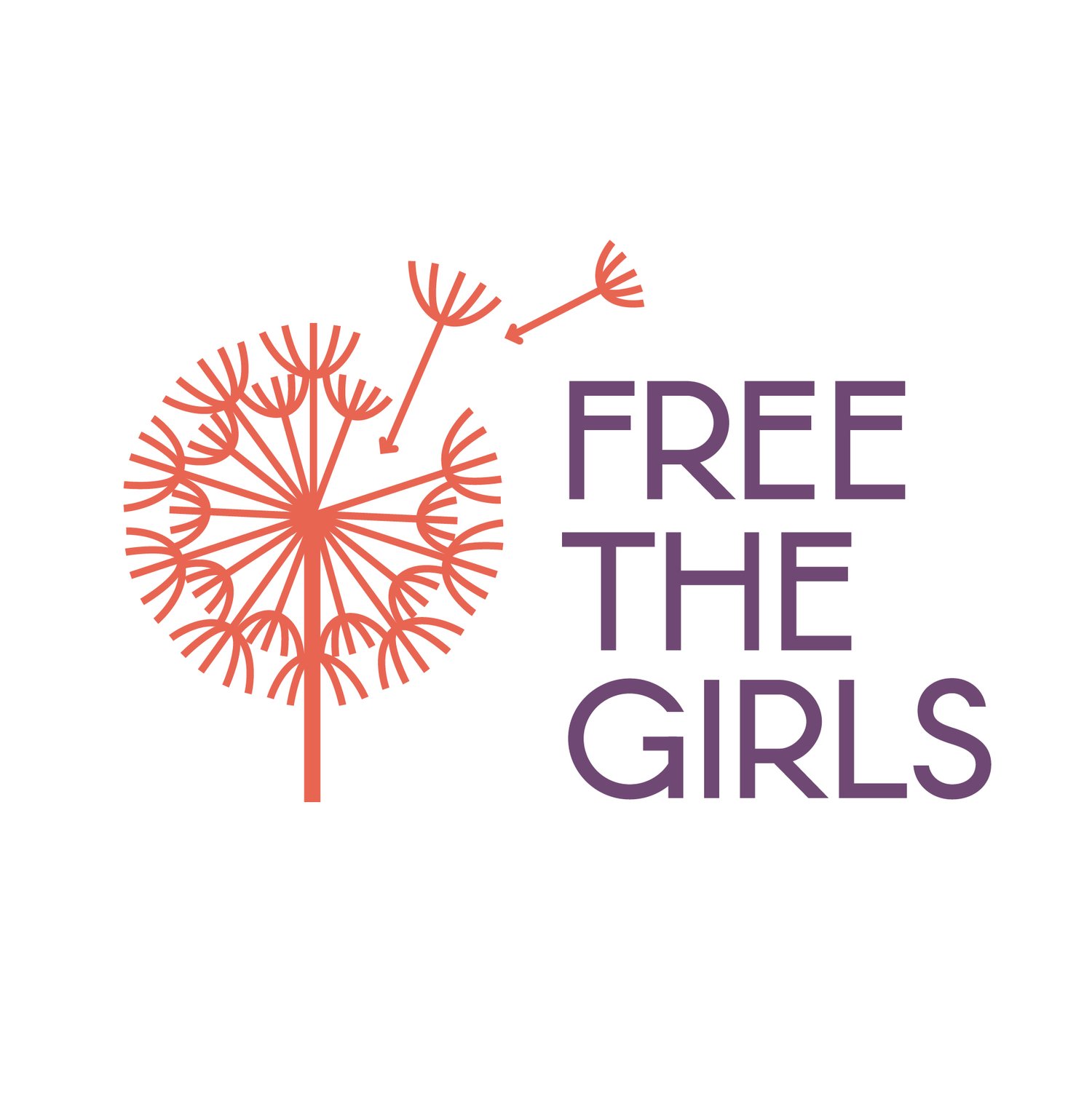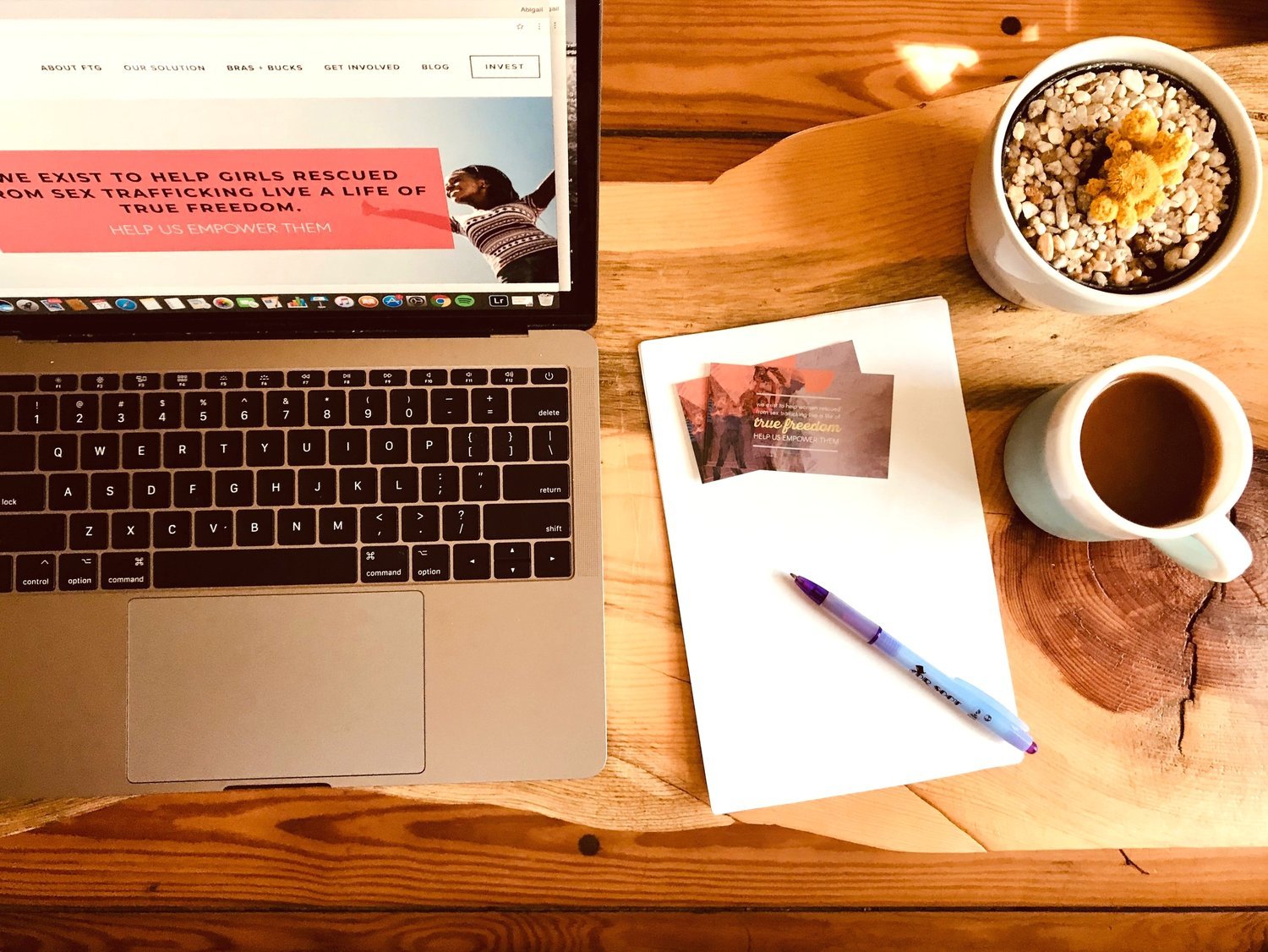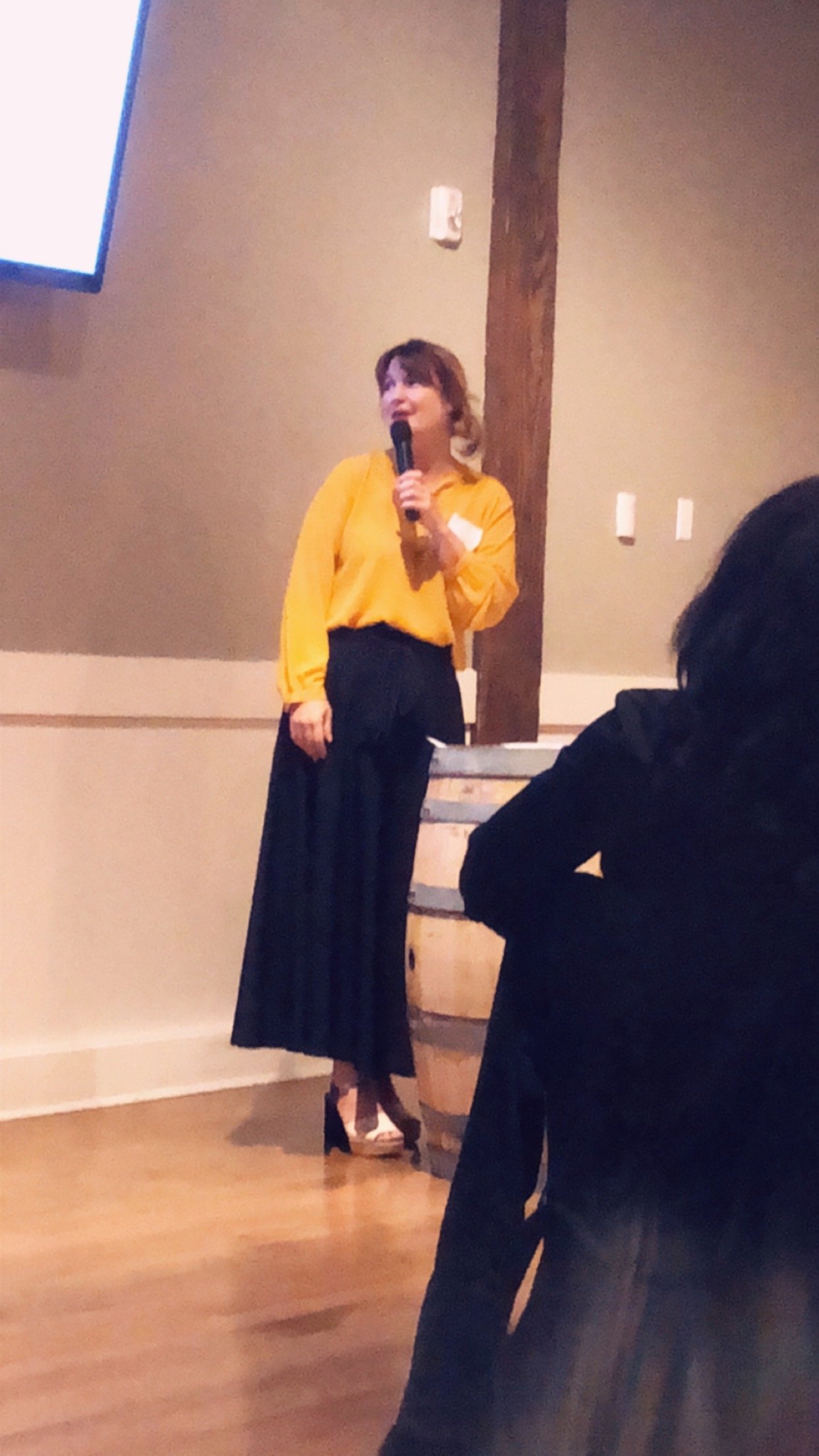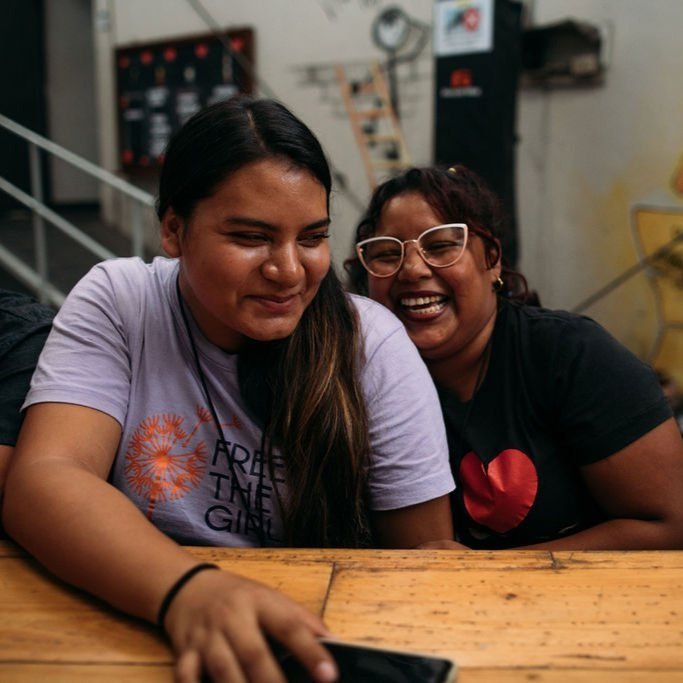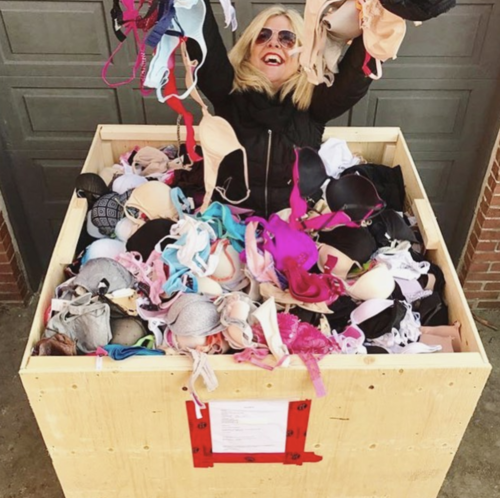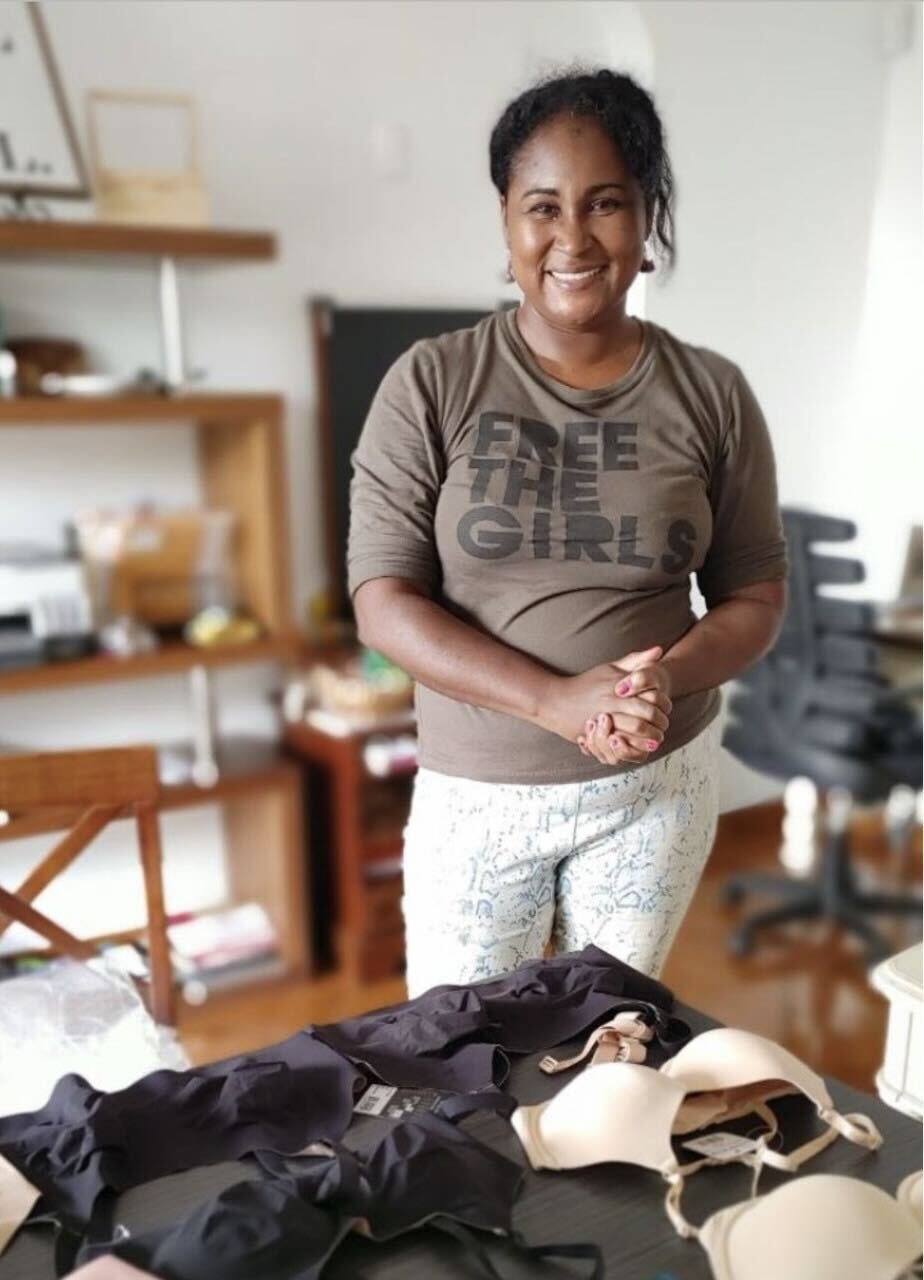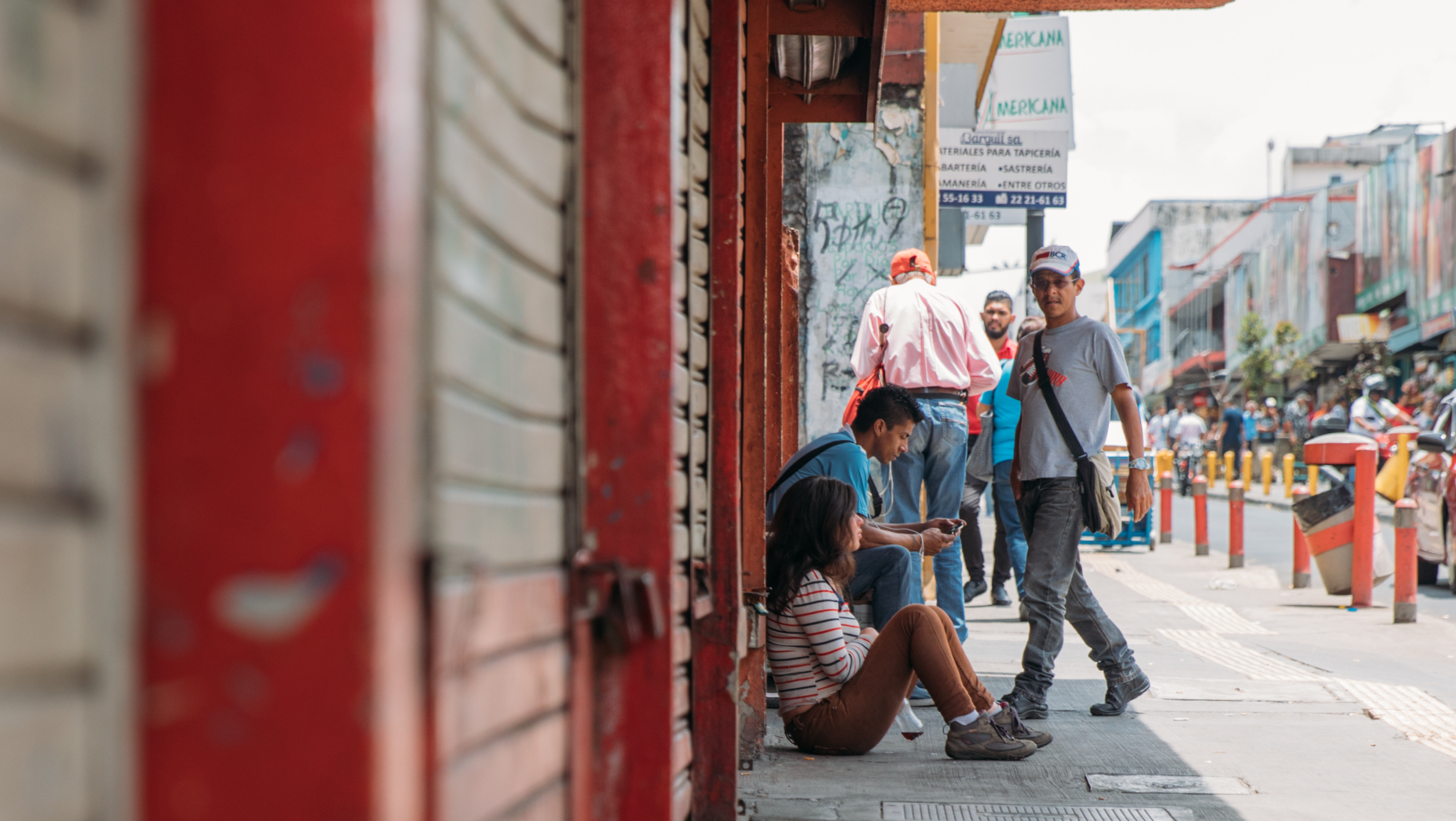Blog
Looking for something specific? Try the search bar.
Journey of a Donation: Then and Now
As we celebrate the 14th anniversary of Free The Girls, we want to reflect on the incredible journey we've taken together, fueled by your generous support. Our mission to empower survivors of sex trafficking to lead a life of true freedom has been greatly advanced through your contributions to what we have playfully called “bras and bucks”. Today, we want to take you on a special journey—the path your donations have taken and the profound impact they've made.
Then: A Foundation Built on Bras
In 2010 when we launched Free The Girls, the foundation of our model was bra donations—a tangible means for survivors to start their own businesses selling the bras collected from bra drawers, lingerie shops, and apparel companies around the world. We knew then that the bra-selling model was merely the “first step” toward sustainable economic empowerment for sex trafficking survivors. It answered the immediate question of “What’s Next?” for women who had exited exploitation. Your contributions provided not just support but empowerment, helping hundreds of women step into roles of independence and economic stability. Thanks to your overwhelming generosity over the years, we're proud to share that we currently hold a three-year inventory of bras ready for distribution to our partners worldwide.
The Transition: Adapting to New Needs
Your bra donations (over 2 million bras in fact!) have allowed us to dig deeper with our program partners and adapt to the individual and collective needs of survivors. As detailed in a previous blog post, our focus has broadened to include exploring alternative economic opportunities in areas where bra-selling is not possible or is no longer lucrative, as well as expanding our other robust reintegration services. There is no one-size-fits-all solution to supporting survivors, and your support enables us to respond to their changing needs.
Now: The New Life of Your Financial Contributions
Today, your financial donations are more crucial than ever as we continue to answer, “what’s next?” for survivors and FTG. With the logistical shift from collecting bras to efficiently distributing our existing inventory, financial contributions are an essential investment. The costs previously associated with shipping donations now enhance our storage capabilities, ensuring that bras are available and can be shipped directly to our partners as needed.
How You Can Still Make an Impact
This shift in funding from shipping to direct support enhances our efficiency and increases your impact, ensuring that every dollar you donate is maximized. Imagine redirecting that typical shipping expense towards empowering survivors. A donation of $50, the average cost to ship a box of bras, now not only contributes directly to storing and distributing these bras efficiently--it also helps fund a holistic support system that includes micro-enterprise classes, job skills training, financial coaching, women’s health courses, counseling, education reimbursement, access to healthcare and social services, and more.
“The $50 that once covered shipping costs can now ensure bras are stored safely and ready to be distributed to survivor owned businesses in El Salvador and Costa Rica, without delay. More so, this $50 now simultaneously supports the holistic development of survivors, helping them forge new paths in life with the necessary tools and training.”
Join Us in Sustaining Freedom
As we look to the future, your continued support is essential. Every dollar you donate helps us maintain this delicate balance of supply and empowerment. Your contributions ensure we remain ready and responsive to the needs of survivors, helping them build new lives on their own terms.
As we celebrate 14 years of impact, let's continue to forge a path toward freedom and empowerment. Donate today and be a part of this life-changing journey. Together, we can make a difference that lasts a lifetime.
Shaping the Future: Dr. Courtney Skiera-Vaughn's Legacy and Kimba Langas' Return to Free The Girls
As we turn the page to a new chapter in our journey, we bid a heartfelt farewell to Dr. Courtney Skiera-Vaughn, who has led Free The Girls with unparalleled dedication for the past nine years. Under her leadership, we've seen transformative growth, launching groundbreaking programs and extending our reach to empower more survivors than ever before.
Courtney's legacy is one of compassion, innovation, and unwavering commitment to dignity and justice. Under her leadership:
102 small businesses were established, ensuring income stability and financial independence for survivors in 4 countries.
88% of FTG graduates have saved funds from their own businesses to purchase land, and many have built homes.
For 7 years, 100% of the children of women in our programs are attending school—preventing a cycle of generational exploitation.
1.75 million bras were shipped to survivors of trafficking.
We onboarded over 300 Drop-off locations across all 50 states + Canada + UK who raised awareness and rallied their communities to get involved in the fight against sex trafficking
For each FTG graduate, as many as four generations are seeing financial transformation and social reintegration.
More than 95% of survivors in FTG remain free from a cycle of exploitation
Read Courtney's farewell letter here.
Simultaneously, we want to welcome Kimba Langas, our co-founder and board president, as the Interim Executive Director. With Kimba at the helm, we are poised to continue our vital work with renewed vigor. Her deep connection to our mission and her strategic insight ensure that we remain steadfast in our goals.
Read Kimba’s reflections on Courtney’s impact and influence here.
Have more questions about this transition, visit our Q&A or send us a message!
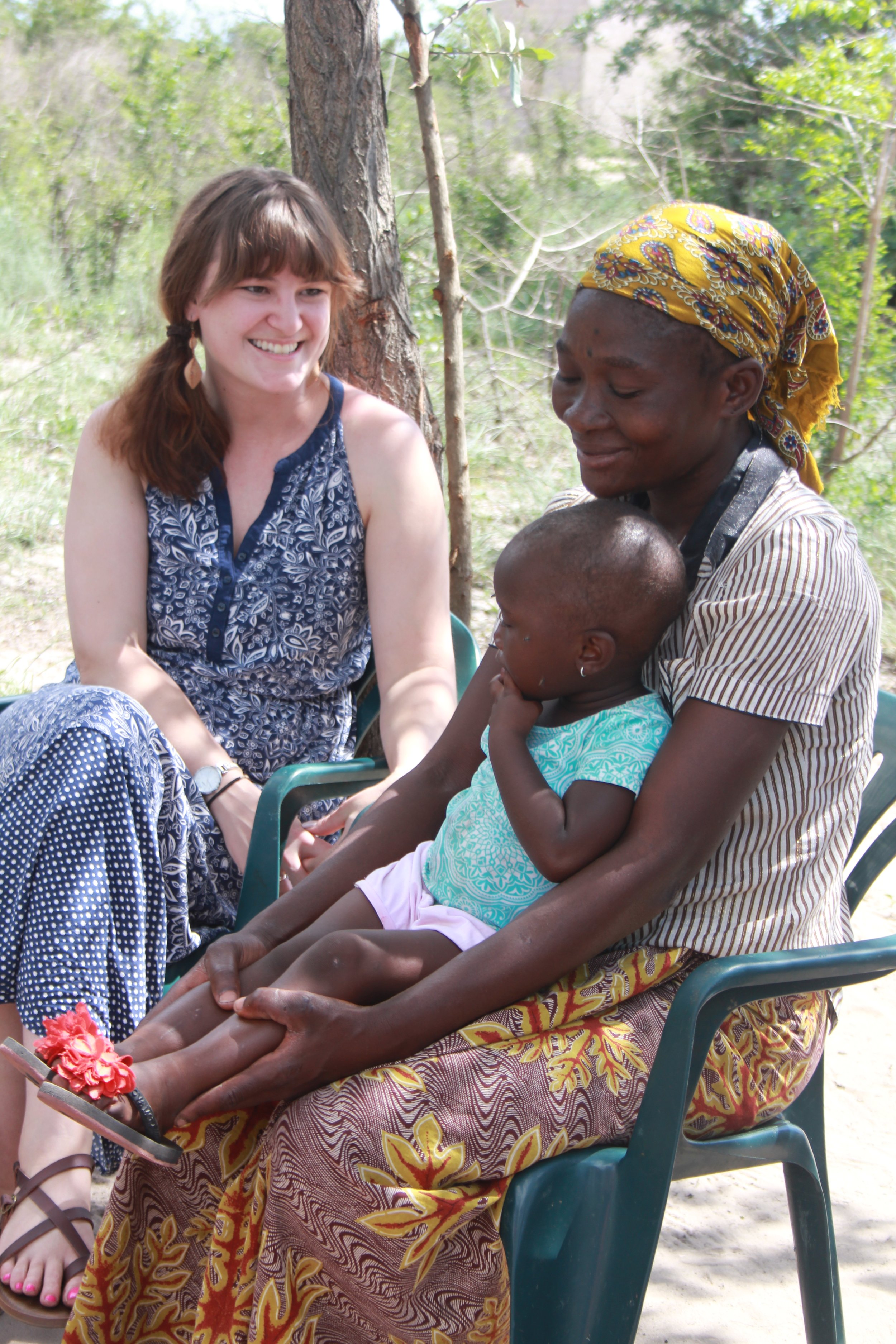

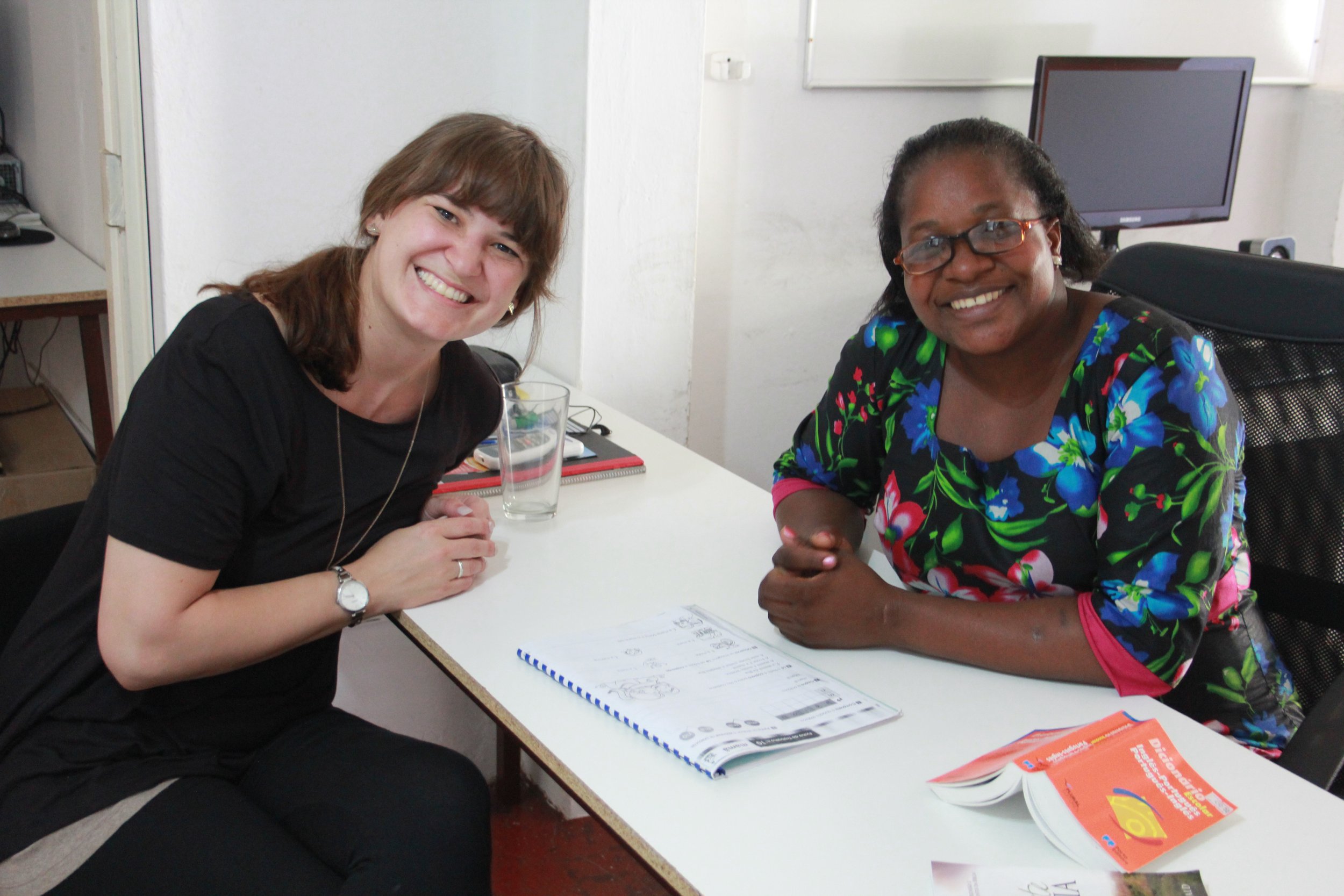

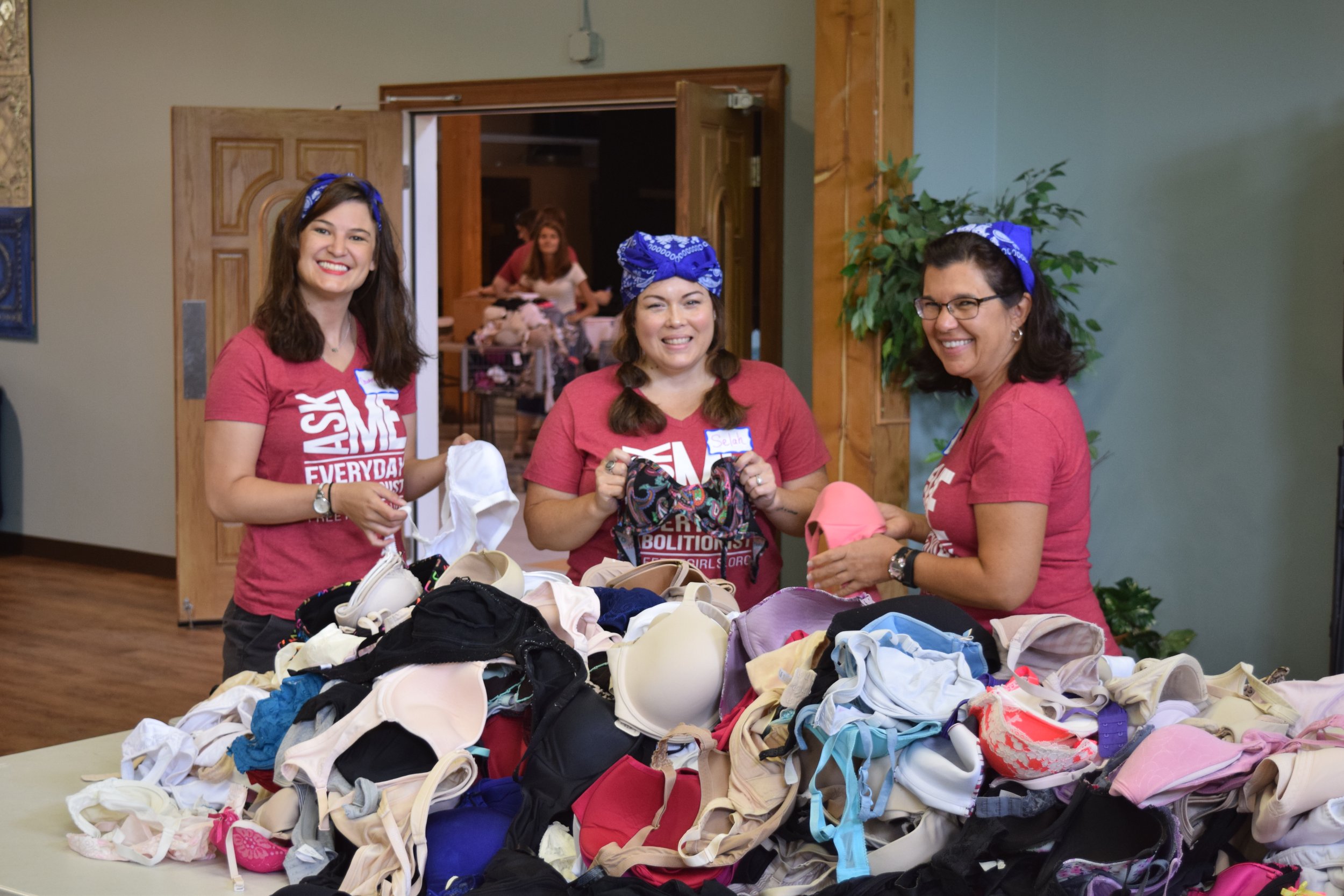
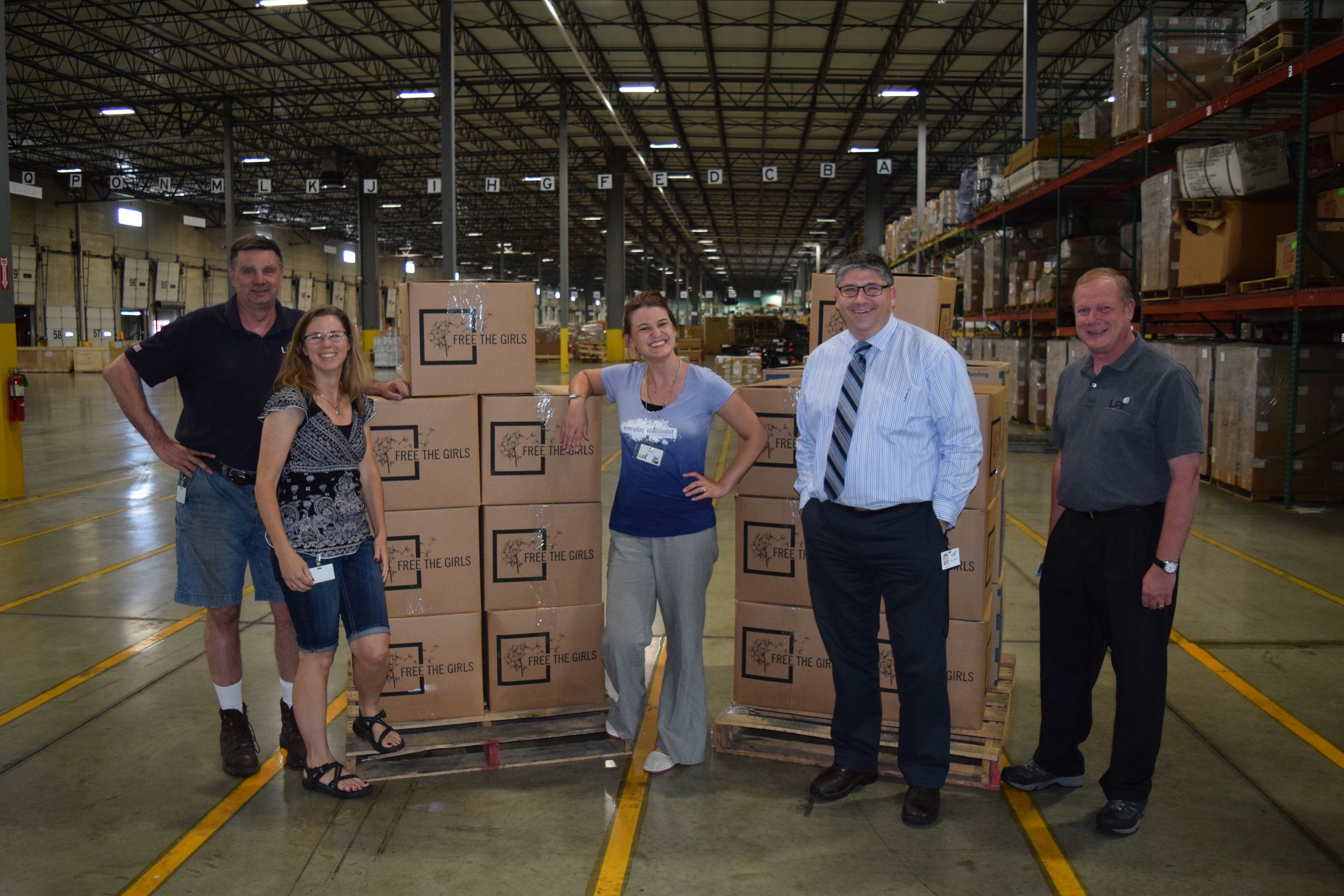
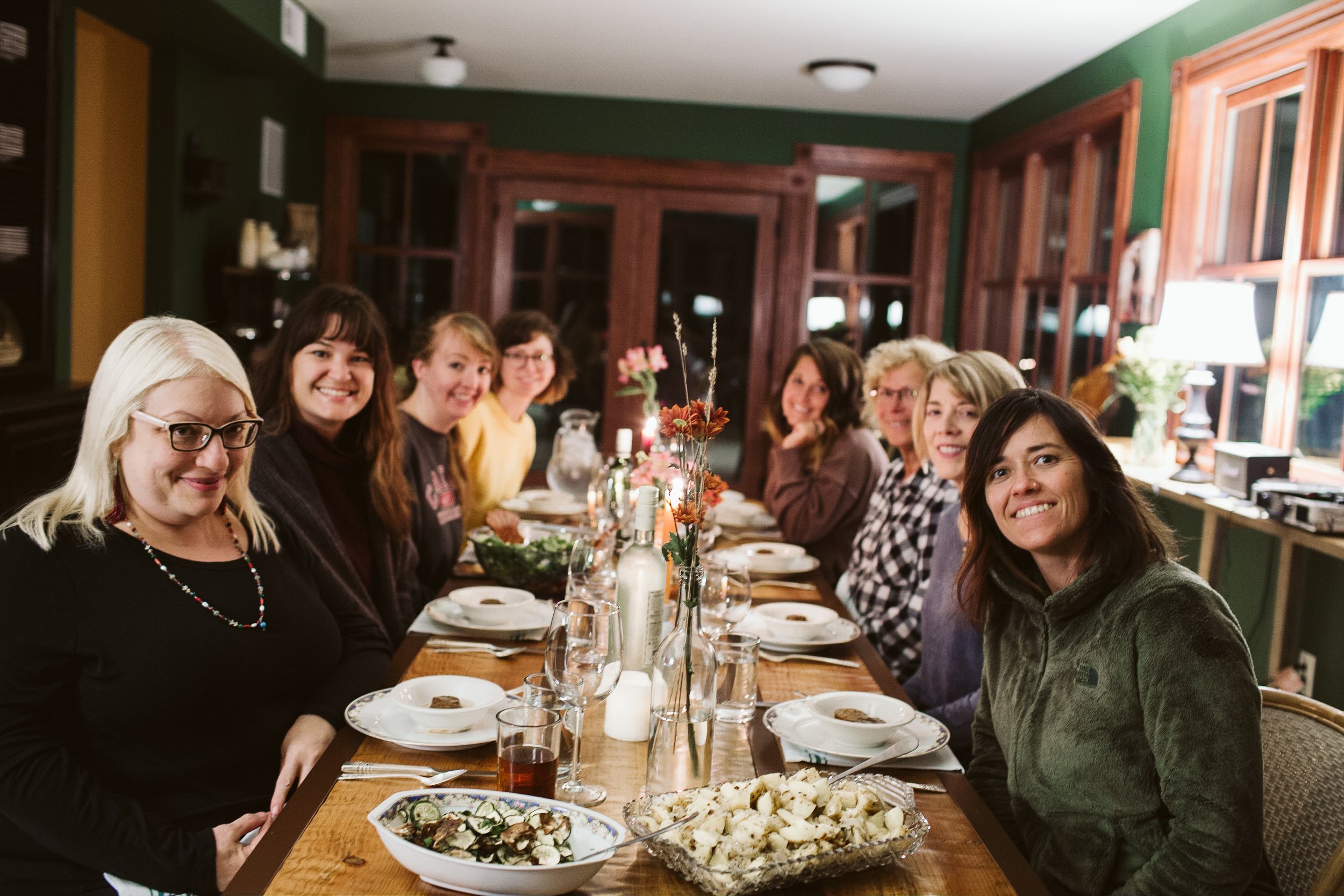
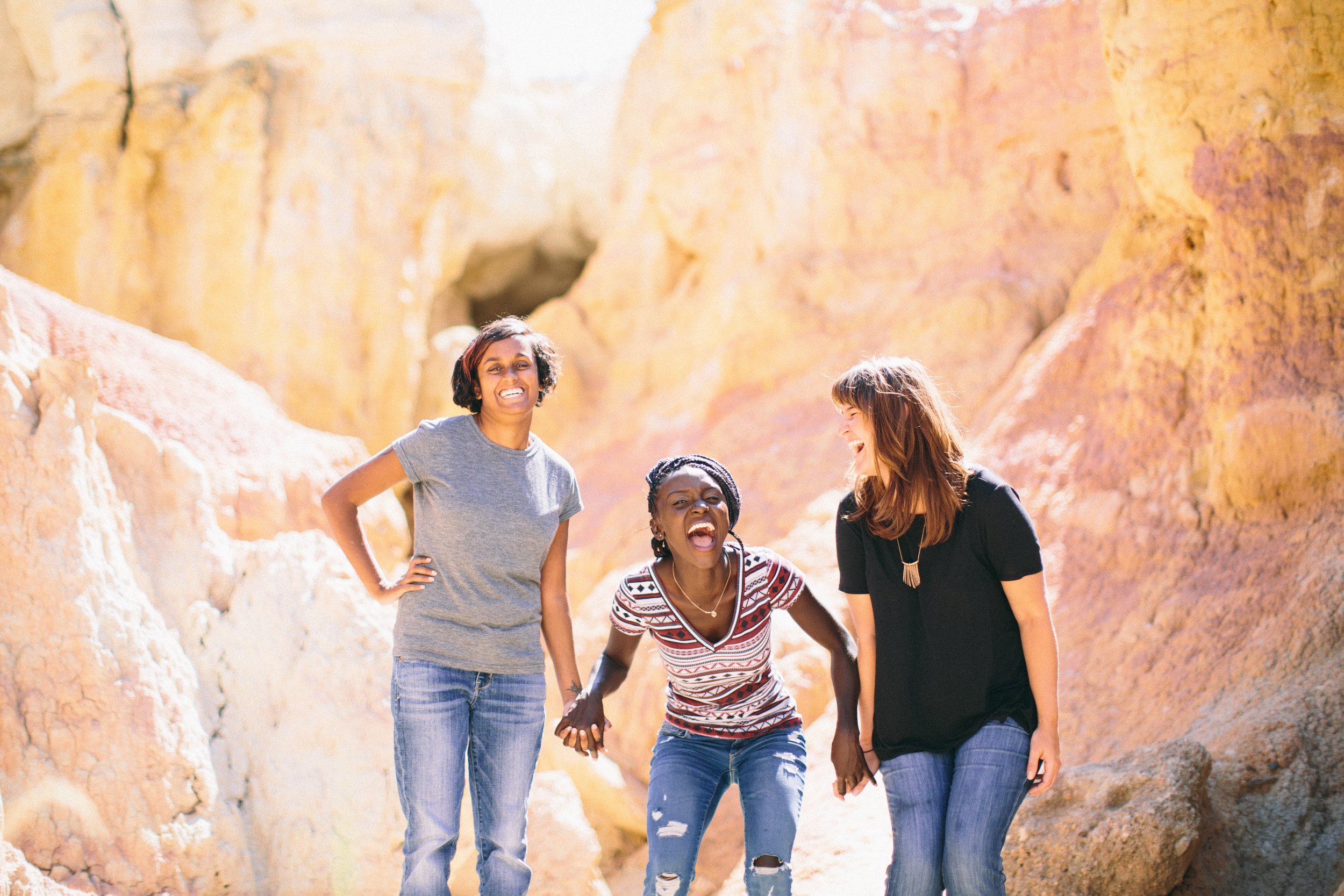
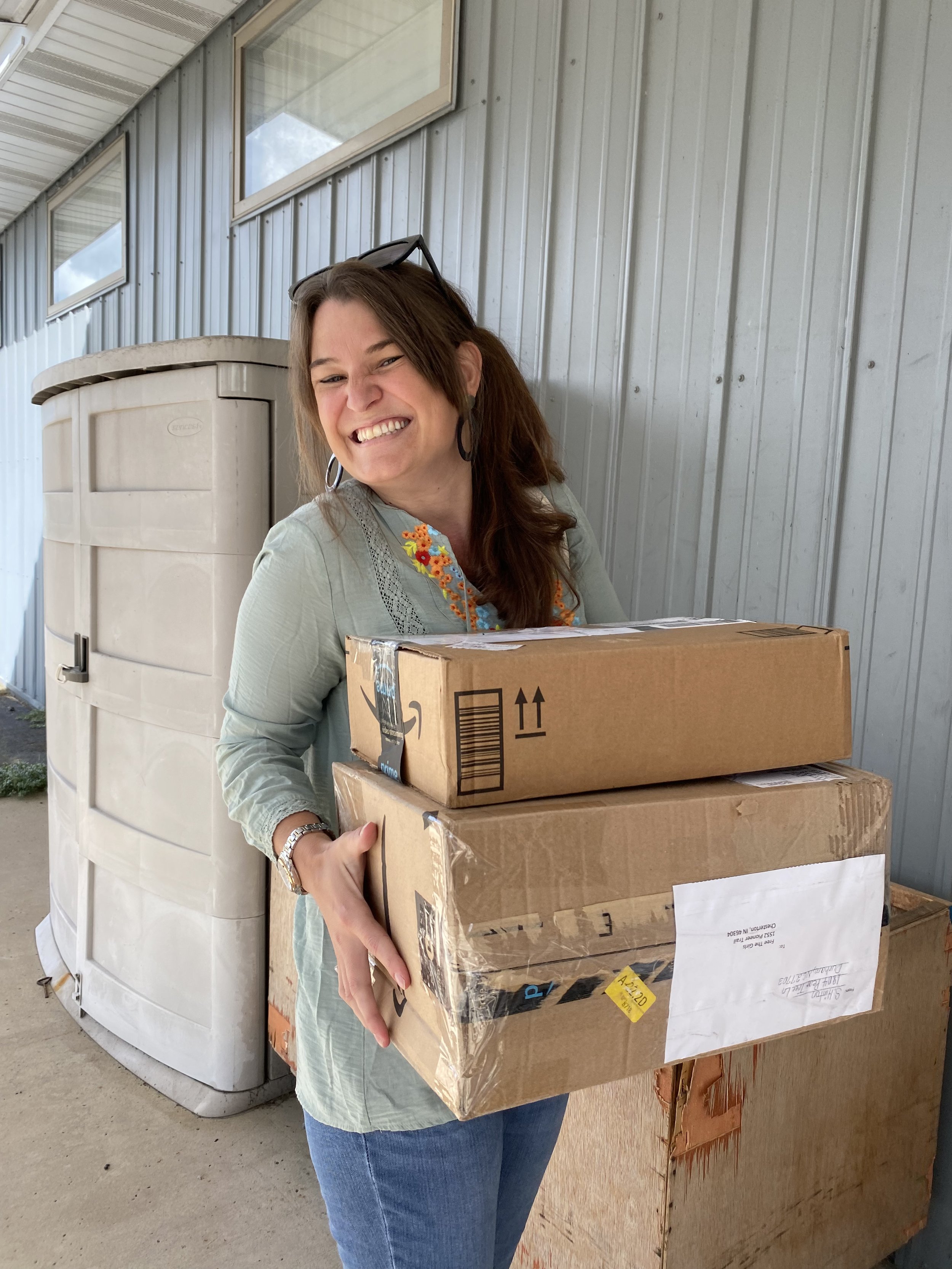
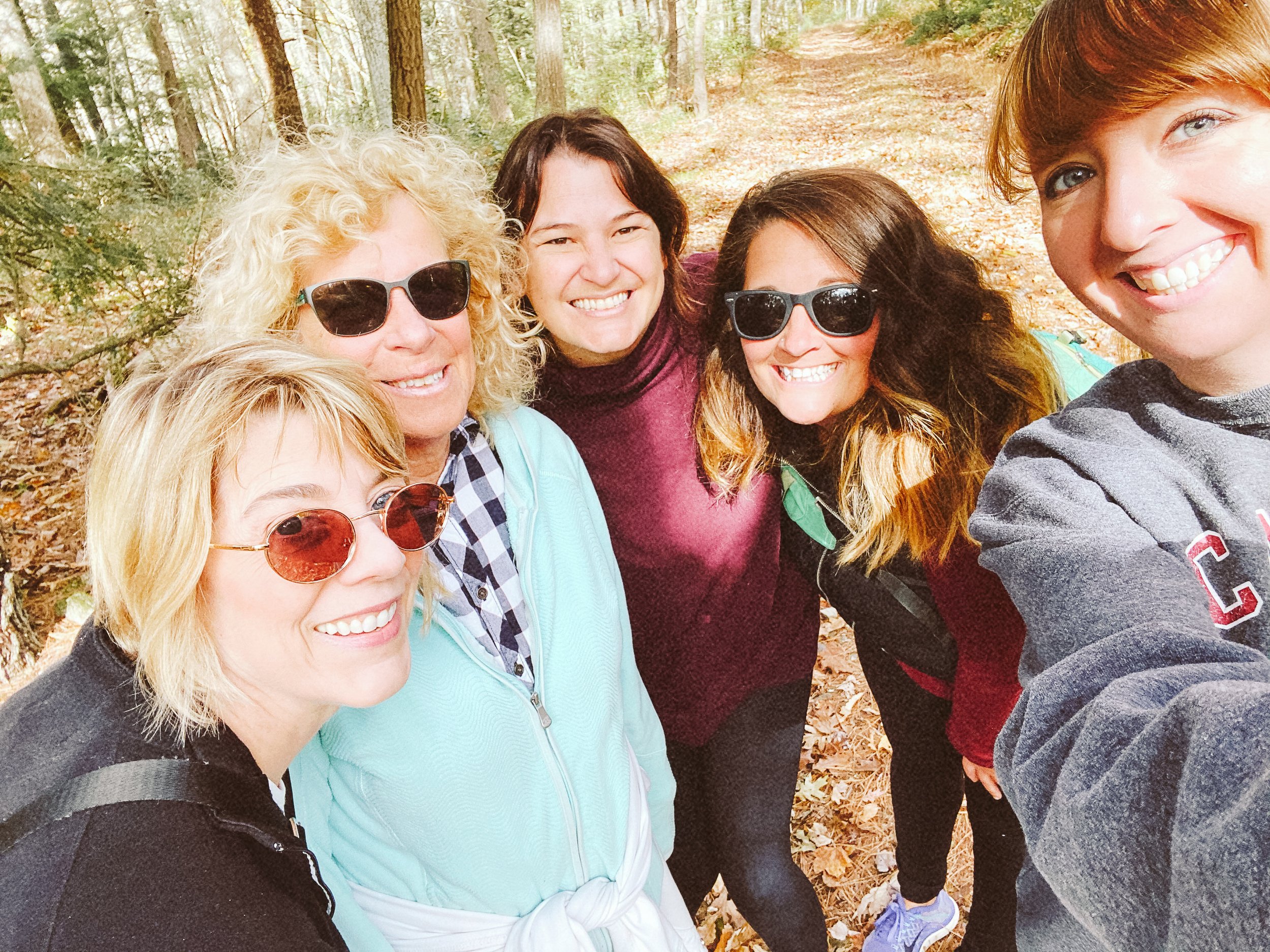
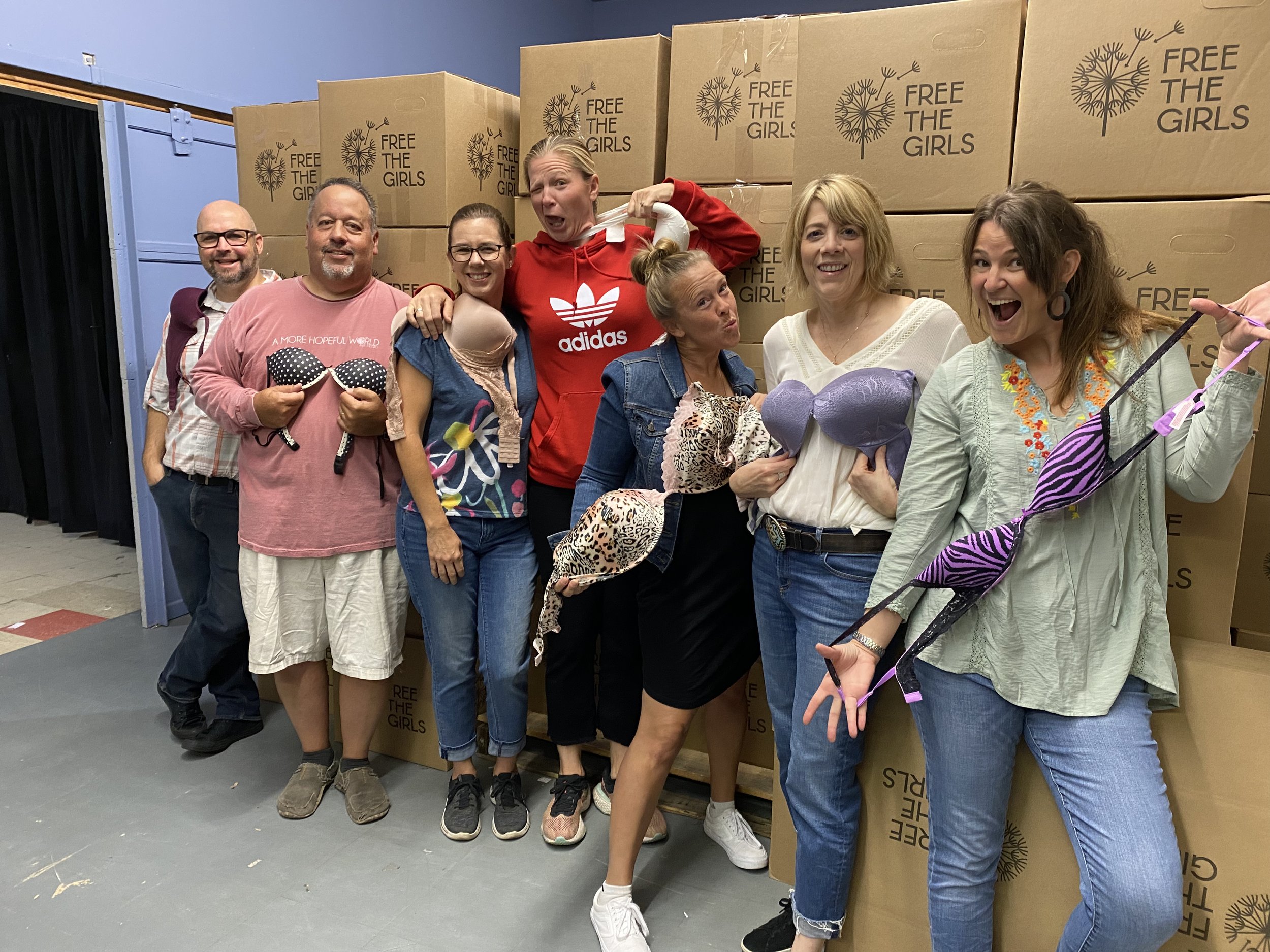
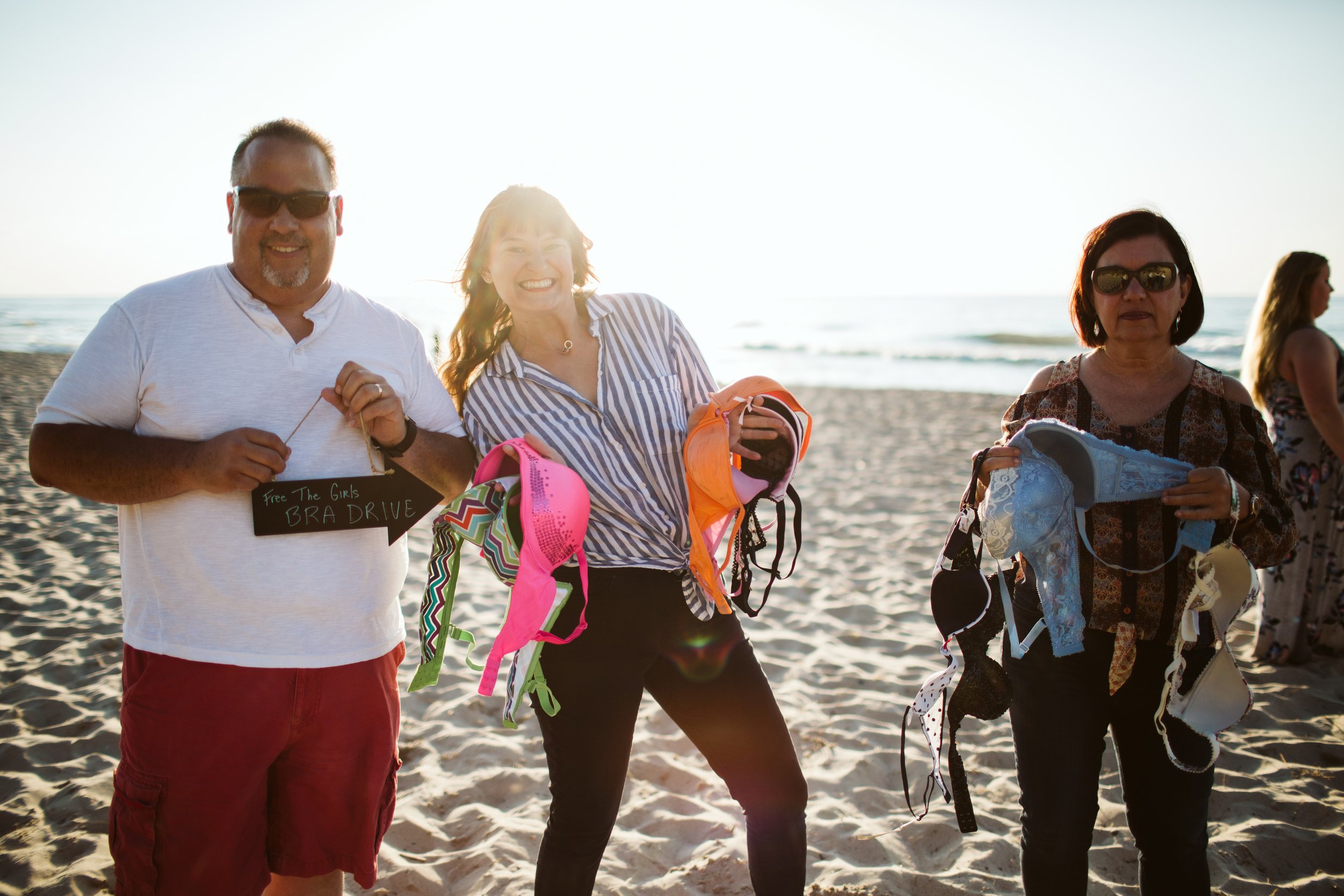
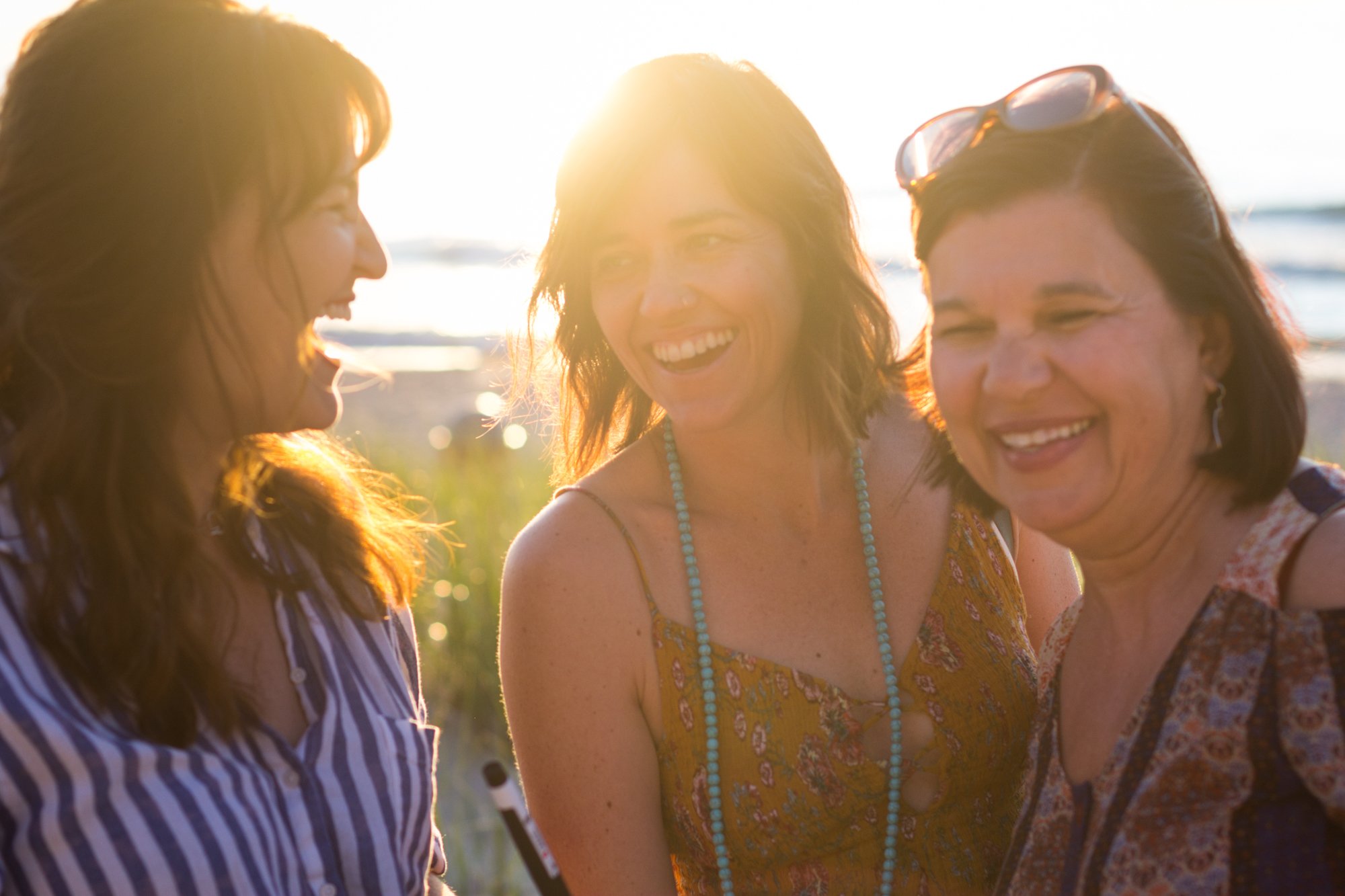
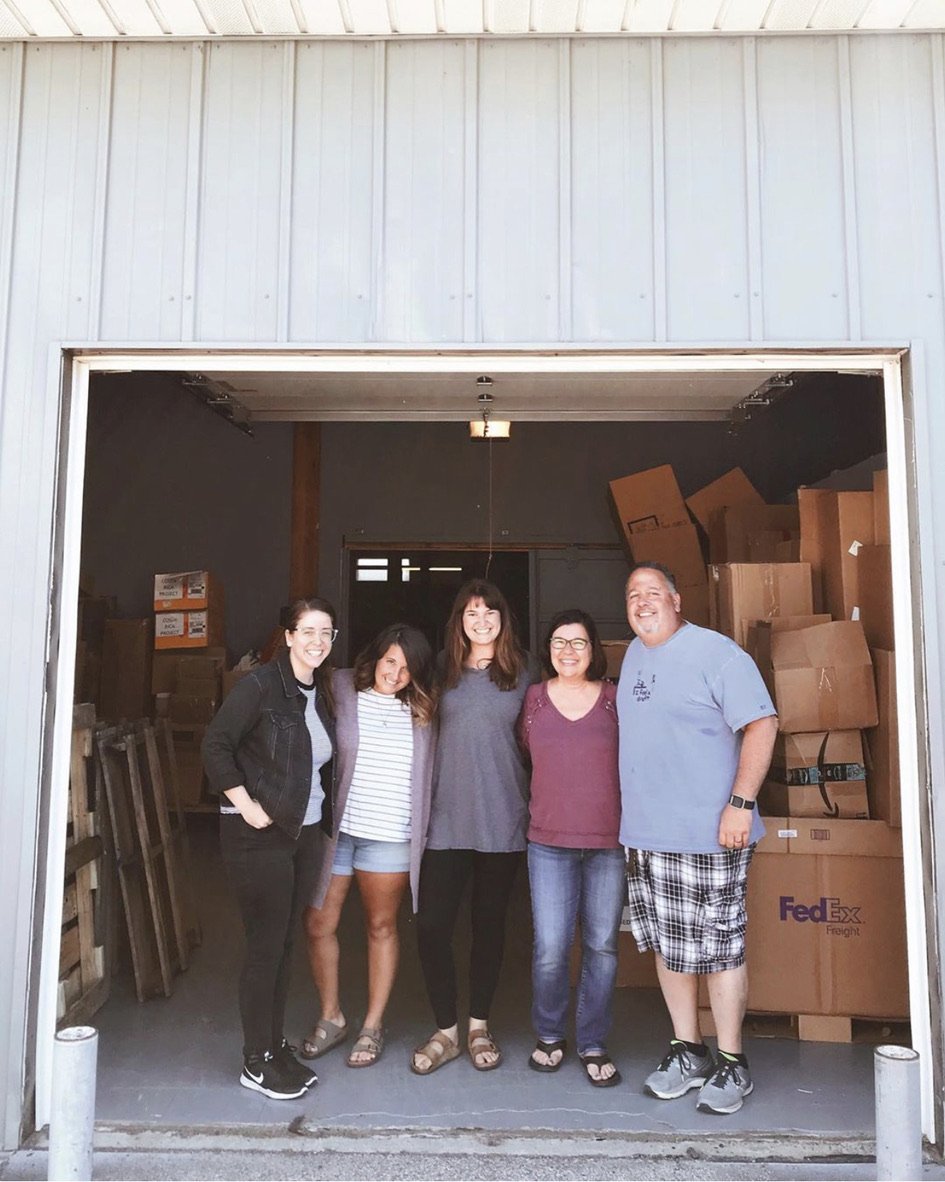
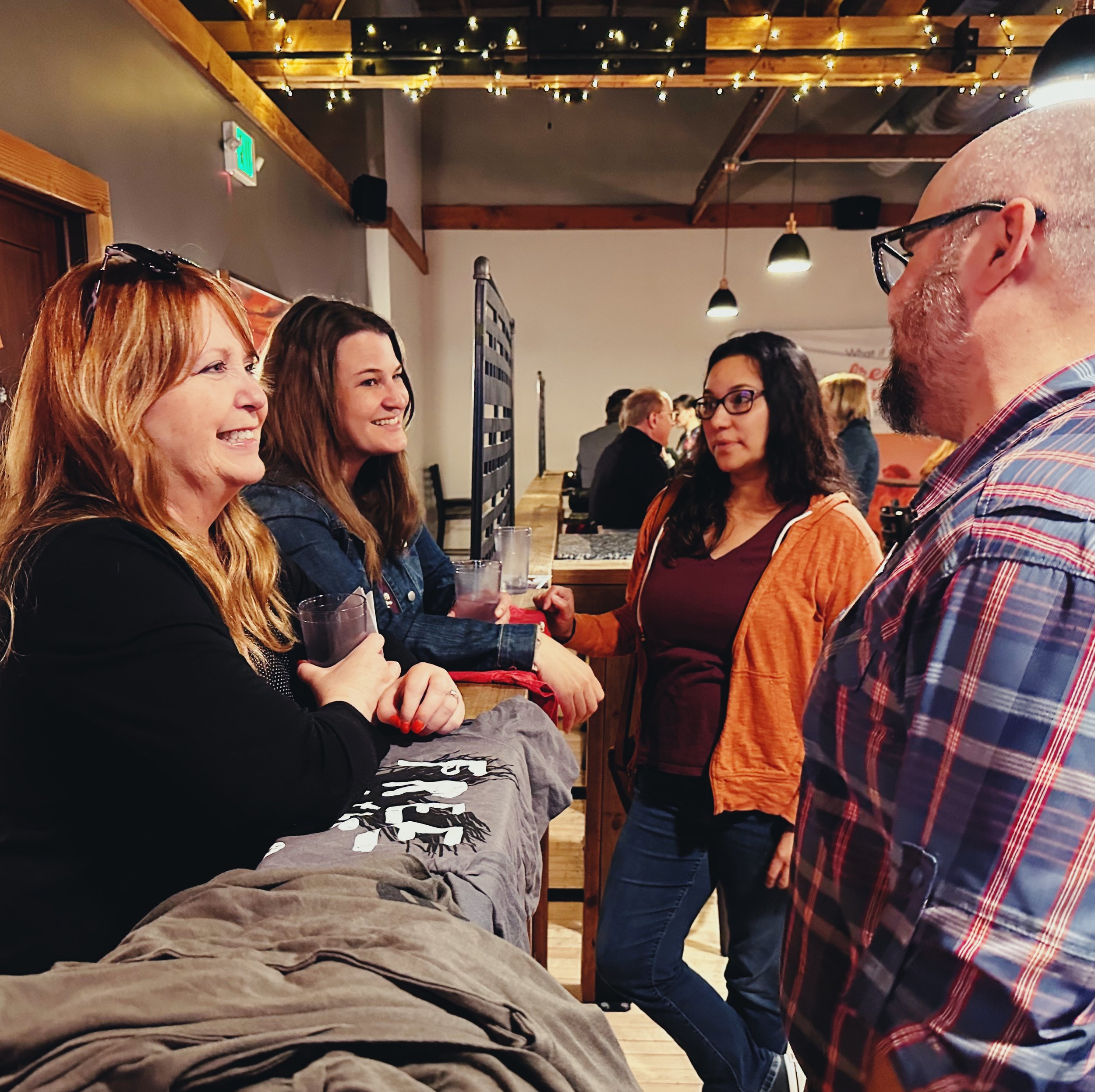
Calling all businesses…
One of our favorite things about FTG has always been how everyone can be involved. This was especially showcased through our Drop-off program - hundreds of businesses and corporations, organizations and offices that were committed to collecting bras in their communities throughout the year and mailing us thousands of bras each month.
These businesses ranged from lingerie boutiques to physician’s offices, from burlesque troupes to church groups, small local shops to global brands, restaurants to corporate offices. While the mission and purpose of each of these businesses was different, the two things they had in common were 1) dedication to help human trafficking survivors around the globe step into true freedom and 2) a community they could count on.
This month, we created individual impact reports for each store - and it was humbling to see the time and resources these Drop-offs have invested over the years and the impact that their customers, staff, and clients made with their bra donations. Just because we’ve moved on from our Bra Collection Initiative, that does NOT mean that these places, so vital to our mission for all these years, no longer have a part to play.
Introducing The Empowerment Collective, a new FTG initiative for businesses, clubs, churches, groups, etc. who are dedicated to the vision of reintegration and global justice. By pledging monthly or quarterly, these funds demonstrate the understanding that true freedom is a long road and they are in it, and that they believe it’s worth investing in.
Our previous drop-offs were given the first invitation, but we want to open this up to all who would be interested. Your financial donations are tax-exempt and make for a great conversation starter with your customers, clients, and staff about your commitment to global justice. It’s a great way to invite your community to become involved in a really unique way. You’ll get exclusive email updates and content, invitations to join with other Empowerment Co businesses, and the opportunity to have FTG host trainings or webinars for your staff, employees, even customers or clients around human trafficking, trauma and being a healing-centered workplace, and even how to become a Freedom Business yourself!
This idea sparked from one of our very own staff members - who also happens to be a businessman, owning and running his very own taproom in Chesterton, Indiana. His business served as a drop-off location from the beginning and is now our first member of The Empowerment Co! If you have any questions, please email joe@freethegirls.org - he’d love to tell you all about it - and maybe even brainstorm some unique ways for your company to become involved!
We are looking forward to continuing to engage with companies, groups, churches, and businesses in this new, exciting chapter of FTG.
Beyond the Red Zone
Think of your favorite space. Maybe it’s home or a local coffee shop or a friend’s living room. Maybe it was your university’s library or a neighborhood park or the beach. Wherever it is, I imagine it’s your favorite for a number of reasons. Some of those reasons may include that it feels safe; you know you’re welcome and don’t have to pretend; it inspires or sparks creative brainstorming; or maybe it’s just somewhere else. Having a space like that might feel commonplace for some of you, while for others it may feel like a luxury.
For the women in the FTG program in San José, we need your help to create this type of space. Since we first began our program in Costa Rica, our office space has been in the center of the Red Zone, a place known for drugs, street-based prostitution, violence, and despair. In the beginning, it was a blessing to have that proximity to the place where current and future clients went about their everyday lives - it helped build trust.
And now, nearly 6 years on, we’re hearing new things. Things like “I saw my old handler when I was walking here today” and “I passed a couple of the old clients/johns” and, sadly, “I can’t come back here. I’m afraid I’ll relapse if I go back to that neighborhood.”
This area no longer serves the women well, women who have taken so many steps to consciously walk away from the Red Zone only to have to return to access our services. We always try hold things loosely so when there is a shift, we can adapt.
We have the opportunity to co-rent a space with two other anti-trafficking organizations whom we have partnered with in the past. This office space will be out of the Red Zone but still easily accessible for those who need to be able to walk there. We envision a place that is comforting, welcoming, beautiful, and inspiring. A place where children can play while their mothers make plans to secure safe housing. A space where survivors of exploitation can sip a hot cup of coffee while discussing microfinancing a future business endeavor. A room where laughter and tears are both welcome, memories of the past and dreams about the future are both honored, where years later, a woman can recall this place as being significant in her journey towards true freedom.
We are budgeting $12,000 for a year in such a space. This means, if you donate $30, you are securing another day of an inviting, safe place for dozens of women and their children to move beyond survivor and begin thriving.
Will you help us?
Beyond Survival: The Unique Path of Free The Girls
In a world filled with countless anti-trafficking organizations each doing critical work, it's natural to question the need for one more. Yet, 14 years ago Free The Girls (FTG) embarked on a unique journey to address not just the immediate crisis of trafficking but the complex aftermath of survival and the path forward. As we've evolved alongside the counter-trafficking movement, learning and adapting, our focus has sharpened on a question that extends beyond ‘rescue’ and rehabilitation:
"What's next?"
When we think about the process of recovery, whether from a physical accident or the trauma of trafficking, the journey is complex and multifaceted.
Let’s consider the analogy of a severe accident. The person calls for help and first responders rush to the scene, helping remove the victim from the scene of the accident and providing immediate assistance to ensure their safety — this is akin to the ‘rescue’ or, as we prefer to call it, the ‘exit’ phase in counter-trafficking.
The next phase involves hospitalization, where the individual receives essential medical care, support, and perhaps, rehabilitation (like physical therapy). This stage mirrors the ‘rehabilitation’ or aftercare in our context, focusing on the survivor's immediate and ongoing needs following their trafficking.
But what happens after the hospital stay? The discharge marks a significant milestone, yet it's not the end of the journey. The individual may face ongoing physical, emotional, and practical challenges in their day-to-day life. They must navigate their recovery, adapt to new realities, and rebuild their life in a way that accommodates any lasting effects of the accident. They may require ongoing support, from physical accommodations to employment opportunities and mental health support. This phase is akin to ‘reintegration’ in the counter-trafficking sphere, where the focus shifts to empowering survivors to not just survive, but thrive.
Reintegration is where FTG's mission truly begins. We collaborate with partner organizations that have accomplished the incredible, necessary, hard work of guiding these women out of dangerous, exploitative situations. These partners provide essential support, including therapy, medical treatment, temporary shelter, and legal assistance. Our role is to build a bridge from the moment of 'discharge' to a future of empowerment and true freedom.
Through the generosity of our donors, we tailor our support to meet the unique needs of each woman we work with. While each woman is different, two nearly universal trends exist in what’s needed: dignified employment and social support. FTG’s initiatives range from providing training for starting a business to helping secure dignified employment, from financial literacy classes to community savings groups, from education support to legal assistance, and much more. Our goal is to empower these women to stand independently so that they never have to rely on an organization ever again to simply get by.
There are victims. There are survivors. And there are those who are thriving members of their community - resilient and breaking generational chains of poverty, exploitation, and oppression.
It's not just about breaking free from the past; it's about building a future that is defined by hope, dignity, and empowerment.
We are not the only ones doing this work. But there aren’t many focused solely on reintegration (or integration for the first time as it may be). Your understanding and commitment ensure that survivors around the world can continue to access services that empower them to move beyond survival to thriving.
Consider joining the Seed Collective, our community of justice-minded monthly supporters, and in doing so, invest in sustainable solutions for survivors of trafficking. Your commitment, even as little as $10 a month, can propel us toward creating long-lasting impacts for the women we serve. Join us in this mission, and be part of a movement that transforms lives and communities for the better.
Who’s Raising Awareness for Human Trafficking Awareness Day?
January is Human Trafficking Awareness Month with January 11th being the official Human Trafficking Awareness Day. It’s a big social media month for many anti-trafficking organizations, ours included.
We had an interesting conversation amongst some members of our staff this month in which it was pointed out that we, as well as other nonprofits in this sector, raise awareness about this issue every month through our posts, our blogs, our very existence! The people who engage with us are people who are already aware of this issue - in fact, that’s why they donate and follow. The people who should really be leading the charge on awareness around this issue is…..you.
You. The everyday citizen. The ordinary individual living your ordinary extraordinary life. You, the person who has family, friends, community, coworkers, neighbors, who don’t have the same level of awareness as you do.
The biggest lie in social justice work is that only a handful of professionals or experts can catalyze change. That’s simply not true. You are a vital piece to seeing a more hopeful world. Because you are able to communicate when we can not. You have relationships that we don’t have. You are able to spread the word, the idea, the mission, the hope to places we don’t even know about. You are able to donate and fundraise. It’s people just like you who connected FTG to all our partners on the ground! It’s all about who you know - and we know you. Who do you know?
So this January, we encourage you to raise awareness.
Wear blue. Not like a little bit of blue - go all out Smurf-style. Make a statement! Make people ask what’s going on with your outfit, giving you an opportunity to say, “How much do you know about human trafficking?”.
Start conversations. It might feel awkward at first, but we have confidence in you! Feel free to forward a newsletter or social media post to break the ice if that feels easier.
Go to your workplace/school/church/group and pitch the idea of a human trafficking awareness seminar. Don’t feel like you know enough to lead it? Email us and we’ll either train you or do it for you! (Seriously - we love this stuff!)
Feel empowered. Because empowered people empower others. Imagine what would happen if every supporter of an anti-trafficking organization took it upon themselves to raise awareness in a thoughtful, intentional way. It would be world-changing…which would become life-changing to those trapped in a cycle of exploitation and trafficking.
Let us know how you’re taking initiative this January or, really, anytime throughout the year! We want to cheer you on and help equip you to be an ambassador for change, for hope, for true freedom.
We’re in this together,
Courtney & all of us at FTG
Standing Together Against HR2601: Protecting Survivor Agency
FTG is a counter-trafficking organization that works beyond our own borders in the U.S. Our programs currently serve survivors in Central America and Africa. However, we are keenly aware of what is happening right here and are adding our voices to the chorus of survivors, victims, and other anti-trafficking agencies and organizations who are speaking out against a proposed bill in Congress, HR2601.
This bill aims “To require entities that contract with the National Human Trafficking Hotline to cooperate with State and local law enforcement agencies when receiving tips via the Hotline.”
What this means, essentially, is that when a victim of human trafficking calls the National Trafficking Hotline, their information is then passed on to law enforcement whether or not they ask, agree, or consent to that.
Why does this matter? Shouldn’t we applaud law enforcement for being ready to step in?
This matters because at the heart of it, human trafficking is stripping agency away from a person. Unfortunately, this bill does the same. We must remember this is a hotline, not a tipline (that’s an entirely different number), and that no other national hotline for helping people are required to do the same. Not domestic violence hotlines, not sexual assault hotlines, not suicide hotlines - they exist to help the person calling, to connect them to resources, to offer assistance for the next steps.
Could you imagine a woman in an abusive relationship calling a hotline to ask for help on how to de-escalate a situation so she and her children remain safe - and for that hotline to send the police to her home? That could get her killed. The same is true for trafficking survivors.
Traffickers often train their victims to view law enforcement as the enemy. If this bill passes, victims who recognize they need help but are still scared of law enforcement will be less likely to call and therefore less likely to receive assistance he or she needs to exit the situation safely.
While we applaud Congress for its continued bipartisan efforts in curbing human trafficking and assisting victims, we must listen to survivors themselves who are overwhelmingly opposed to this bill.
One easy and meaningful way you can stand with survivors is to contact your representative and inform them that you oppose Bill HR2601. I can take as little as 5 minutes.
Find your representative here. You can email all of them straight from this site. Write a message about your opposition or, if that’s too daunting, use this template from Love146:
Dear Representative [Their Name]:
I am writing as a constituent to oppose H.R.2601. H.R.2601 would require the National Human Trafficking Hotline to turn over information from calls to law enforcement without survivors’ consent.
The National Human Trafficking Hotline is a HOTLINE, not a TIPLINE. No other anti-violence hotlines are expected to violate survivors' privacy and safety in this way.
This bill is being rushed through without Congress listening to the voices of survivors who overwhelmingly oppose this legislation.
I oppose H.R.2601 in any form and urge you to do the same.
Sincerely,
[Your Name]
You can also edit this message however you wish. Again, this seemingly small act can make a big difference and will take just a few minutes.
This is how you stand with survivors and elevate their voices.
Use your power to help empower others.
Other ways to stand with survivors:
Educate yourself on the realities of human trafficking as opposed to the myths
Take a training course from local organizations and then volunteer your time
Donate to trusted counter-trafficking organizations
Thankful we are in this together,
Courtney
12.15.2023 UPDATE: Thanks to your outreach efforts, we have successfully prevented H.R. 2601 from advancing to the House floor for a vote during this session. While the exact number of individuals who urged Congress to reject H.R. 2601 is unknown, it's noteworthy that within a mere two weeks, 644 of you utilized Polaris’ Take Action page to send letters to your respective Members of Congress! There's still a chance that Congress may revisit the bill in 2024, so don’t go anywhere, survivors still need your voice and support.
Want to get more involved in Giving Tuesday this year? Here’s how!
Oh, it’s that time again – Giving Tuesday is less than a month away!
If you’ve been around us for a while, you’ll know we LOVE Giving Tuesday. Why? Because it’s the day where we see global generosity – people from all over the world gathering together virtually to spend their money to fund causes that literally help change the world. Black Friday and Cyber Monday are great days for gifting loved ones (bonus points if they’re ethically made products!), followed immediately by Giving Tuesday to gift fellow humans with dignity and empowerment.
This year, your FTG Giving Tuesday donations will go towards existing and new reintegration services for survivors of trafficking. Counseling, business training, entrepreneurial endeavors, community and social support, savings groups, women’s health – can you think of anything greater than being a part of a woman’s brand new future, one she has chosen for herself?!
In fact, we are launching a new program in Central America with 10 identified women who will be participating in the first class of FTG Honduras. Your donations help fund a new community of survivors and their families, walking alongside them as they begin to experience true freedom. What does true freedom look like? Take a look at one woman’s story in Costa Rica. Each survivor has their own experiences, and we are excited to get to know and work with these 10 new individuals in San Pedro Sula.
We aren’t asking for donations (yet!) – but are inviting you to be involved in Giving Tuesday in a new way – hosting your own fundraisers! If your people are on all the socials, create a fundraiser on Facebook, Instagram, or TikTok and share with your friends. If you’re off socials, you can create a personalized fundraiser on our website and email your contacts all the info. Organizing your own fundraiser isn’t nearly as daunting as you may think – we even have some shareable posts and suggested scripts to help you navigate the process which you can access here. Maybe you’ve held fundraisers in the past – we’d love for you to do it again! It’s so incredibly helpful. This year alone, fundraisers have brought in nearly $9500!
Be a part of the global giving trend for a good cause in a very impactful way. Have questions? Email us and ask!
Unity in Purpose: Forging Collaborative Paths in the Nonprofit Sector
The early days of Free The Girls were a mix of excitement and challenges, but one aspect took us by surprise, and not in a good way: the competitive nature of the nonprofit sector. We understood the scarcity of resources and the constant struggle for funding, but we initially assumed we were all united by a common purpose. It was disheartening to realize this wasn't always the case.
As an organization, we made a firm commitment to foster collaboration whenever possible. The reflexive questions when someone expresses a desire to start a new nonprofit are, "Are you certain someone isn't already addressing that issue? Most likely, they are. How can you contribute rather than compete?" We believe working together for a common cause is far more effective than duplicating efforts and that it’s not about competition, but connection and partnership.
So we continually ask ourselves, ”Where can we contribute?” While many nonprofits strive to innovate and expand their services, securing funding often proves to be the biggest obstacle. Pooling resources for the greater good just makes good business sense.
Fortunately, we have aligned ourselves with like-minded organizations and individuals who share our vision.
Expanding our integrative services is done through collaboration. Over the past decade, we've closely worked with our partners on the ground, listened to the survivors we all serve, and identified areas where we could complement our trusted partners and bridge gaps in funding and services. We asked, “How can we enhance your ability to serve survivors more effectively and meaningfully? Where can we create maximum impact?”
One remarkable partnership we forged was with Mission To El Salvador (MTES), which brought Free The Girls to El Salvador to provide job opportunities for survivors of sex trafficking in the city of San Salvador. The Executive Director of MTES, Danielle Snyder, aptly explained, “Free The Girls has provided a valuable missing piece to the puzzle of helping survivors of sex trafficking. Rescuing is done by law enforcement, and counseling is done by psychologists and social workers, but then what?” (read more here)
The "what" is where Free The Girls steps in to offer a crucial transitional step that helps women avoid returning to the streets of San Salvador. MTES tirelessly provides resources to the San Salvadoran community. Through our partnership, we help trafficking survivors establish their own businesses. As we continue to listen to the needs of our valued partners at MTES and the women in the program, the scope of our assistance keeps expanding. What began as an economic empowerment program now encompasses aspects like education reimbursement, matching grants, and women's health support.
In case you missed our "Women Warriors" video release, it illustrates our enduring partnership with Mission to El Salvador and how our programs work in synergy to provide holistic support to survivors. To learn more about the incredible work MTES is doing within their community in El Salvador, please visit their website at missiontoelsalvador.com.
Beyond Bras: Simple Made ExtraOrdinary
Last month we announced our decision to move beyond bras. We understand that this might appear as a significant change for our dedicated supporters and followers. For over a decade one of our most prominent and successful initiatives, and arguably the avenue by which most people came to know Free The Girls, has been our bra program.
But we are first and foremost a counter-trafficking organization committed to providing reintegration services for survivors. And that hasn’t changed, it’s only grown (thanks to your support and generosity!)
So yes, while the way we provide economic empowerment is evolving, we want to reassure you that who we are hasn’t changed at all.
We launched from the idea that something simple could become extraordinary. That a bra sitting unworn in the bottom of your drawer or tucked away in the back of your closet could become a lifeline for a survivor. A simple donation of a bra could become a livable wage - a safe, dignified way for a survivor to meet her basic needs while healing from the trauma of her past. And what we saw was exactly that.
Your seemingly simple gestures yielded extraordinary results.
What began as a small garage filled with bras soon burgeoned into a warehouse brimming with inventory, extending across multiple countries, where survivor-owned bra businesses thrived. Extraordinary.
What started as a few individuals, a couple of churches, MOPS groups, and local businesses evolved into a captivating CNN documentary and then blossomed into incredible partnerships with compassionate and generous brands like Aerie, Hanes, AdoreMe, Harper Wilde, Title Nine, Kindred Bravely, LR International, One Republic, and their foundation, The Good Life, as well as the charitable outreach force of BTS, One in an Army. Extraordinary.
From the seed of a simple bra program, we grew our economic empowerment initiative to encompass job skills training, education reimbursement, matching grants, a women's health initiative, and the expansion of these vital services. Extraordinary.
From a single country with a handful of women in our program to 6 countries and counting. Extraordinary.
We've successfully launched 102 micro-enterprises, and countless survivors have secured dignified jobs, choosing job skills training over entrepreneurship. Notably, 100% of the children of women in our program are in school, their education funded by their mothers with support from FTG as needed. An impressive 83% of our graduates have invested in land or built homes using the funds earned from their businesses or through matching grants, ensuring a safe and secure place to rest their heads at night.
The magnitude of this impact is immeasurable and can’t be overstated. And it all started with a bra. Something so simple. Extraordinary.
And we want to celebrate that. And honor that. Your donated bras are the reason we can now extend our focus beyond bras and offer more comprehensive support to survivors. That, my friends, is nothing short of extraordinary.
So yeah, this may seem like a big shift. But it’s rather simple. In response to feedback from survivors and the evolving economic landscape, we are ready to adapt. We no longer rely on bras to sustain our economic empowerment program. With your support, this simple shift can become extraordinary, creating more opportunities for survivors around the globe.
Together, we can prove that something simple can still be extraordinary.
Invest in Girls' Rights: Their Leadership, Their Well-being
October 11th is celebrated around the world as the International Day of the Girl. This day, organized by UNICEF, focuses on the need for greater investment into the well-being and rights of girls across the globe. It is hard to find a day or a cause, that we believe in more than investing in girls!
The reality is that girls around the globe face significant disadvantages in terms of education, health care, social status, and protected freedoms. In our work we see this reality play out in girls who are more susceptible to being exploited because of the vulnerability created by these disadvantages. Girls who lack agency and choice in their life because of their social status, or lack of access to education, health care, or economic opportunities, are far more likely to be exploited.
This is especially true in cultures with forced child marriages.
Our investment into girls and women, here at FTG, takes different forms.
Health: Our new Women’s Health Initiative is an effort to bridge the knowledge gap that exists in some cultures, with women and their own bodies. This lack of knowledge can lead to exploitation, an inability to seek medical care, and poor health. Since the launch of our newest initiative in Zambia, we have already seen hundreds of women and girls participate. This knowledge will have ripple effects in their communities, and through generations of women. UNICEF says that every dollar invested into sexual and reproductive health for girls can yield economic returns of up to $120! You can invest in that initiative directly here.
Education: Beyond health, we invest in education for women in our program and their children. In many locations, there are school fees and other hurdles for girls gaining access to schooling. We work with our program partners to provide this access and cross these barriers. The job skills training we provide also seeks to fill in crucial, but missing, life skills and educational competencies that allow women to run their own businesses or find success in the workplace. Studies show that by continuing in school, each year of additional education for a girl can increase her potential income by 10-20%.
We are working with potential partners in several new countries to develop programs that are specifically aimed at serving girls who have been exploited, working to provide healing and resources that will allow them to flourish as women.
If we want to be part of shaping a more hopeful world, it begins with investing in a generation of girls that can grow into flourishing women. This is a world where girls are educated, where they have agency and choice, and where we all use our resources to correct the imbalance of opportunities afforded to girls around the world.
Begin today with a donation to Free The Girls.
International Day of Peace
Guest Post by Abby Mortenson
“Universal flourishing, wholeness and delight…the way things ought to be.”
These words may not seem to fit within the narrative of our current culture right now, let alone the landscape of human trafficking and exploitation. But we at Free The Girls have a longing and a commitment to see that it would.
In 1981, the United Nations established the International Day of Peace as “a day devoted to strengthening the ideals of peace” and this year’s theme is called Actions for Peace: Our Ambition for the #GlobalGoals. “It is a call to action that recognizes our individual and collective responsibility to foster peace.”
As we take a moment to think about this International Day of Peace, we think about the many barriers that survivors have to living lives of peace. We think about the many ways peace has been stripped from them and even after exiting exploitation, how trauma can steal one’s peace. And we recognize, as the UN encourages, that we have an individual and collective responsibility to foster peace.
So how do we do that?
First, we must understand what “peace” really means.
The true meaning of peace is not just the absence of war, but a deeper, more holistic word that encompasses more than just serenity. In Hebrew, this word is Shalom. A beautiful explanation of this word comes from Cornelius Plantinga who writes;
"The webbing together of God, humans, and all creation in justice, fulfillment, and delight is what the Hebrew prophets call shalom. We call it peace, but it means far more than mere peace of mind or a cease-fire between enemies. Shalom means universal flourishing, wholeness, and delight—a rich state of affairs in which natural needs are satisfied and natural gifts fruitfully employed, a state of affairs that inspires joyful wonder as its Creator and Savior opens doors and welcomes the creatures in whom He delights. Shalom, in other words, is the way things ought to be.”
THIS is what we desire for the women in our programs (and for all survivors around the globe).
Universal flourishing.
Wholeness.
Delight.
Shalom: the way things ought to be.
This is why we’re committed to true freedom: women walking in wholeness in all areas of her life.
We’re so honored to walk alongside women who are choosing to step into peace as they heal through their past and work toward their futures.
We also recognize that the collective humanity has a responsibility to change the systems that allow for trafficking and exploitation in the first place.
According to writer Nathan Hunt,
“Shalom is the outcome of just systems, righteous living, equitable conditions, and reconciled relationships which are validated at the margins by the wellbeing and voice of the vulnerable. It is a vision beautiful and mighty, cast by God himself, but it is never to obscure present predicaments of injustice. Rather, the vision electrifies our bodies and imaginations with dissonance. It refuses the easy peace of the powerful whose call for order seeks to maintain a self-serving status quo. In situations of domination, shalom demands liberation. Shalom is “the abolishment of the structures of oppression and violence”.
It can feel like an insurmountable task, but the reality is that we can all make a difference and take steps toward a more just world that points back to shalom.
When we take into consideration one person at a time, one survivor at a time, one transformed life at a time, we can see that Shalom can be a reality.
We want to remind you of 3 simple ways YOU can help bring peace to survivors of trafficking and exploitation:
1) Join our Power to Choose campaign today and help create peace one life at a time.
3) Pray - tap our downloadable prayer card below.
Wait, what about the bras?
Since its inception, FTG has been most known for our relationship with bras – collecting them from people just like you to provide inventory for survivors of trafficking in the developing world to establish their own local micro-enterprises, helping them secure economic stability.
It’s been an incredibly successful 13 years with this particular entrepreneurship model.
But here’s the thing – it's essential to understand that just because something worked well in the past doesn't ensure its future success.
Besides, the longer you engage in this work, the more valuable insight and experience you gain.
So let’s address each of these, starting with the latter.
During our extensive work with survivors over the past 13 years, we have done our best to adopt a posture of humility and curiosity, consulting the women we support to identify and understand the key factors contributing to their sense freedom You’ve heard us say it before but it’s worth reiterating, true freedom isn’t simply distance from a trafficker. Not when the threat of re-exploitation and re-trafficking are so real. Read more on that here.
As the women have defined freedom over the years, we’ve listened and allowed those conversations to lead the services we offer. While we are best known for our bra selling initiative, it remains just a single piece of our larger economic empowerment program. In fact, in the countries we currently operate in, only two of the five utilize our bra selling initiative. And out of the two countries we are introducing initiatives in this year, only one of those will be implementing bra selling businesses, and on a limited basis.
Why is that?
Well, let’s return to our initial point – we’re no longer seeing the success we’ve celebrated in the previous years. Post-pandemic life brought significant changes for all of us. For those in poverty-stricken areas of the developing world, the impact has been even more severe. Challenges in shipping logistics, deep economic recessions, global politics – all these factors have profoundly impacted the women’s businesses. In fact, 2023 marks the first year ever that we will not be shipping inventory at all. The reason for this decision is that there is an ample supply of bras in-country from our last shipment. The demand for these "luxury items" (which contributed to the program's past success) has diminished significantly, as potential customers now face financial constraints and must focus on essential expenses like rice and rent rather than discretionary spending. As a result, many survivors running bra-selling businesses have already begun adapting their models by introducing alternative items for sale or pursuing different training opportunities to ensure a more sustainable income in the future.
In light of both these factors, rather than holding onto the past, we are reorienting our efforts toward the diverse array of reintegrative services we provide. From economic empowerment education to alternative trainings to women’s health to housing assistance to money management to connecting them with local professionals for addictions and trauma treatment to creating social safety networks – we’ve been on this path for years and now it’s time to go all-in.
That being said, your bra donations have made incredible opportunities possible and created tangible results for survivors of trafficking. You can see that impact here. In fact, because of your generosity, we currently have enough inventory to gradually offramp this initiative, ensuring the women have supplemental income through bra selling as we further develop alternative economic empowerment initiatives.
Whether you realized it or not, if you’ve given a bra or bucks in the past, you’ve already been a part of the reintegrative story for women all over the world. We invite you to continue to invest in these women’s lives, their businesses, and their healing. Donate once or, even better, sign up to be a monthly donor and help empower these women as they navigate their path towards true freedom.
Introducing FTG’s Women’s Health Course!
As part of our commitment to holistic recovery, we’re proud to introduce our new Women's Health Course!
This curriculum is designed to equip survivors with essential knowledge about their bodies, health, and well-being. Instructors, with their caring and supportive guidance, ensure that survivors have the tools they need to regain control over their lives.
Our course is comprised of a series of modules, each addressing vital aspects of women's health:
1. Female Anatomy: Understanding Our Bodies
By exploring female anatomy, survivors learn about external and internal structures, cultivating a deep connection and understanding of their bodies. Confidence in discussing body parts and functions becomes second nature, breaking down stigma and shame.
2. Menstruation: Navigating Our Cycles
In this module, survivors dive into the natural rhythm of their bodies. We debunk myths, explain menstrual cycles, and provide practical advice for managing symptoms. By learning how to track their cycles, survivors gain agency over their bodies, ensuring that they are prepared for every phase of the journey.
3. Sex Education: Empowering through Knowledge
This module is dedicated to fostering the understanding women need to navigate the complexities of intimacy and consent. Survivors engage in open dialogues about consent, exploring the nuances of sexual experiences. By nurturing a culture of informed choices and respectful boundaries, we empower survivors to confidently set boundaries and make informed choices.
4. Pregnancy: The Journey Unveiled
Our course delves into the profound journey of pregnancy, providing survivors with comprehensive insights into conception, pregnancy stages, and the postpartum period. This module ensures that survivors are equipped with essential information, empowering them to make informed decisions about motherhood.
5. Birth Control and Family Planning: Empowerment Through Choice
The Birth Control and Family Planning module empowers survivors with a myriad of choices. From an array of birth control methods to family planning options, survivors emerge equipped to make decisions that resonate with their individual journeys. This knowledge unlocks a future brimming with possibilities and agency.
Our Women's Health Course goes beyond individual empowerment; it radiates positive change across communities. By educating survivors about their health and bodies, we break down barriers of silence, promoting open dialogue and understanding. This ripples through communities, fostering empathy and support for survivors, ultimately contributing to safer and more inclusive spaces.
Survivors emerge from this journey empowered, equipped with knowledge that helps them reclaim their bodies and lives. As they share their insights with peers and family, they ignite a transformative cycle of change. This course has the power to bridge gaps in understanding and foster unity, cultivating a vibrant community of survivors who uplift and inspire one another.
Join Us in this Empowering Journey
Today, we invite you to become a part of this life-transforming initiative. Your support will enable us to expand the Women's Health Curriculum to reach even more survivors, creating lasting change in their lives and communities.
Let's shape a world where knowledge is strength and every survivor's voice is heard.
To make a difference, donate now and help us empower survivors on their path to healing and transformation.
Your contribution matters. Your support makes change possible.
Empower survivors.
Transform lives.
Donate to the Women's Health Curriculum now.
Learning to Hope and Dream Again
Know the term learned helplessness? Think back to your Intro to Psych course in college. Or that podcast or book everyone said you had to read. Or even your own experience of feeling like there’s no point in trying because everything is working against you to prevent you from achieving your goal.
50 years ago, two researchers coined the term to describe what happens when a person repeatedly experiences pain, stress, or dejection and they eventually learn to expect the pain, the stress, the dejection and therefore reach a point where they don’t even try - even when all obstacles are cleared away. It’s a pretty bleak state to be in. The implication of the original idea was that we need to look backwards - at all those upsetting and potentially traumatic events - and reframe what happened to help move forward past learned helpelessness.
But now, all these years later, these same researchers are amending their earlier theory. They’re now saying that we do not need to look backwards - we need to look forward. We need to retrain our brains (with something very, very cool called neural plasticity) with learned hopefulness.
This isn’t pie-in-the-sky-Pollyanna-type of hope. One psychologist explains,
“Hope is the only positive emotion that requires negativity or uncertainty to be activated. We don’t need hope if everything is all right.”
This type of hope looks at what’s around and can imagine a future different than one’s past or present. (Sounds an awful lot like healing from trauma, doesn’t it?)
Earlier this month, some of our staff members were in a meeting in which we were able to explain the way we’ve see the women in our program begin to dream and hope. When we first started this organization 13 years ago, we would ask the women, “What’s your dream?” and were often met with blank faces. It’s awfully hard to think about the future when your present is eking out survival and your past is filled with pain. But what we found was that in time, with support and financial stability, the women learned to understand the question. They would come in and say, “I know what you were asking now! My dream is….” (everything from “reading my kid a bedtime story” to “having a safe home” to “finding someone who loves me”). We saw this in the pandemic - women in El Salvador saying, “Our business may have shut down, but we can make it. We’ve faced harder things” as they adapted in some unique and creative ways. In fact, we have an entire introductory section to our economic empowerment educational initiative that is titled, “Permission to Dream.”
Dreaming is hopefulness.
While this comes naturally to many of us as children, as adults it becomes a skill with practice required to overcome feelings of inadequacy, hopelessness, despair.
We’ve got some great quotes coming your way later this year from some of the women you help support through your donations to FTG, and many of them are around dreams, hope, future, freedom. Surviving as a survivor is hard - not just physically but emotionally as well. But when they are able to practice hopefulness, practice dreaming, practice excited anticipation of future surprises - well, we have come a long way on our healing-centered journey.
Defining “Success”
Another day, another blog post on definitions! Our emphasis for this month centers on the way survivors define their future and, in that context, their unique perceptions of success.
But here’s the thing – we don’t want to define success. We want the women to define success for themselves based on their lived experiences, their social and cultural contexts, and on their individual dreams and aspirations. This means that sometimes they choose paths that seem counter to what we would choose.
Let’s look at a real life example, one which even gave us pause. (Because we are still learning as well!)
Step into the story of a woman, we will call her Dorothy, in Costa Rica (alias used to protect her identity but the factual experiences of her story remain unchanged). As a child, she lived on the streets for two years before being exploited and trafficked for sex starting at age 10. She developed a severe addiction to hard drugs that persisted for three decades. Consequently, she became estranged from her entire family, including her mother, brother, and even her own children – the emotional wounds ran so deep that they refrained from acknowledging her as a mother, using derogatory terms instead as a means of protection. The cycle of addiction, prostitution, abuse, family hurt, isolation – this was the pattern that defined Dorothy’s life.
She came to FTG in 2018 but quit the program within a few months - which may sound like the opposite of success to some. But Dorothy quit to enter into a detox and rehab facility by her own choice. She couldn’t do both at the same time, and she saw a future clean of the drugs she had relied on for so long to numb all the pain she felt. Success for Dorothy was defined by taking a step toward this future.
She came back to FTG in 2021, clean and sober, still estranged from family, but with goals and dreams. Within a year of being a part of FTG’s economic empowerment program, she had paid off debt, found a place to live, and taken advantage of our education reimbursement program - enrolling in a night school to get her diploma. After that, she kept going, taking classes to become certified in geriatric nursing. She would often send selfies to our staff - taking notes in class, with her teachers, and in front of the whiteboard. And then she landed a job doing just that!
We have been so proud of her! Dorothy, sober and in a great job in the medical field! What more could she ask for?
So we were surprised when we heard she was quitting her nursing job. Taken aback when we heard she was doing it so she could open a soda shop instead. Wait – what? That feels like going backwards, not moving forward to success, right? Maybe to us. But to her….
The nursing job was a very challenging environment for a recovering addict - the stress of the job combined with the access to addictive medication not a good recipe for success. So she calmly, deliberately made the choice to quit.
“The old Dorothy was coming out. I have to protect who I am now.”
And, for one of the first times in her life, she had an option to actually protect herself and the confidence in her skillset to know she could find an alternative job. That’s how she defined success.
So where does the soda shop fit in? We’re getting to that.
Dorothy’s last contact with her estranged family involved a physical altercation resulting in the police being called. But now? Within the past 2 years, she has reunited with her family. Her mother gave her a plot of land to open this soda shop - a joint endeavor with her brother. And her daughters have begun calling her by her own name. Dorothy explained to us that this is the future she’s always wanted – a family, social stability. And now she has it. It may not be as lucrative as a nursing job. But that’s now how Dorothy is defining success. She’s defining it as meeting her grandchildren, as working side by side with a brother she hadn’t spoken to in years, as family dinners around her mother’s table. And she knows that she has options now if the soda shop fails. She has been trained, she has degrees and certificates, she has choice.
Ultimately, choice is how many of the women define success. And because of that, it has informed ours.
The 2023 TIP Report and Why Getting it Right Matters
Last month, the US Department of State released the 2023 TIP Report.
For those unaware or in need of a refresher, the TIP Report, or the Trafficking in Persons Report, is an annual report that the US government publishes that looks at trafficking trends throughout the globe and rates countries on their anti-trafficking efforts. There are 3 Tiers to this grading system.
You are able to access the entirety of the report directly from the State Department’s website here, but we thought we would share some of the information that stood out to us here on our blog.
Misinformation, myths, and stereotypes about human trafficking in the general public continue to be a barrier to anti- and counter-trafficking efforts.
We’ve mentioned in our Myth-Busting webinar previously how sharing information, stories, or media that aren’t factual can have real-life consequences and be detrimental to actual assistance to trafficking victims. The 2023 TIP Report hits on this theme as well. They reference Polaris’ survey of trafficking survivors in the US which reported that the vast majority of individuals who had been trafficked do not fit into the Hollywood abducted-by-traffickers-and-sexually-exploited-in-an-underground-criminal-ring stereotype. While cases like this have been reported and have happened, a child is much more likely to be trafficked for sex by a family member or romantic partner than a stranger, and labor trafficking is more common than sex trafficking. In addition, UNODC shows that 40% of identified trafficking victims are male.
These statistics matter. They aren’t just numbers. They represent real people. Here’s what the TIP Report has to say: “Many survivors with these underrepresented experiences or backgrounds have difficulty finding acceptance in organizations and communities, such as faith-based organizations, because they do not match the narrative most often elevated by the organization and the broader field.” This means that when we continue to elevate stories that fit into the perfect victim narrative, showcase stories that make us feel good but are one-in-a-million, and share imagery or narratives that are not representative of the reality, we can be making it harder for victims to access services they need.
So, what can you do?
Become a conscious consumer of media and news. Know what trafficking is – and what it isn’t. Help educate others on the realities of vulnerable persons. Awareness is good – but more people know about human trafficking now than they ever have. Let’s help make the shift from awareness to education which is better for us all.
World Day Against Trafficking in Persons
July 30th is World Day Against Trafficking in Persons, an awareness campaign initiated by the UN.
The theme for 2023 is “Reach every victim of trafficking, leave no one behind,” and they list statistics that show how global detection and conviction rates have fallen rather substantially since 2020. Of course there are lots of theories and data around this idea, and let’s remember this is a very complex and very nuanced discussion. For instance, for the first time, more trafficking victims reach out to authorities or organizations on their own volition as opposed to being identified by either those authorities or organizations. This could either mean a colossal failure of detection and a need to re-educate people in positions who may intersect with victims OR it could mean that educational campaigns have done an amazing job and victims are more empowered to advocate for themselves and recognize the signs of their own trafficking. It could also be a both-and or neither-nor.
But what we do know and can all agree on is that people should not be trafficked. People should not be exploited for financial gain of an oppressor. People should not be forced, coerced, or deceived into labor or sex trafficking. And sadly there are whole groups of people who are still left behind in anti-trafficking endeavors.
We at FTG are working in the reintegration sector – but this also doubles as tertiary prevention – a fancy term that means long-term responses aimed at preventing the re-exploitation of a person. We have found that when individuals are not given the tools to combat their vulnerabilities – especially economically and socially– they are at risk of being re-trafficked. Without a social support, in the absence of a way to afford a safe and dignifying life, a person could easily become desperate and become a target once again.
Your donations go towards providing services and resources to help change the trajectory of a woman’s life. Having access to education, job skills, safe housing, medical care, and social services along with a community of people who understand, accept, and support a person can make all the difference in the world. Help us continue to remove barriers for true freedom in a survivors’ life.
Freedom!
Ooooh – we do love a day to talk about independence and freedom!
These are two ideas that are discussed at length frequently. When we work with survivors and partners who live in countries currently under police regime with suspended constitutional rights or live in countries under dictatorship with no real freedom of press or in countries with histories of civil war or genocides, it makes us even more passionate about working towards freedom on the individual level.
But how do survivors define freedom? It’s obvious but worth the reiteration that survivors are unique individuals with their own ways of understanding and defining such terms – this is not a homogenous group – but there are themes that arise when the conversation turns this way.
One theme is that of choice. Many of us would assume that people who have lived in oppression and exploitation, in forced sexual situations, would define freedom as being away from the brothels or the street-corner or the gaze of the pimp or madam. But we have listened to many survivors define it as much deeper.
Freedom is being able to choose:
Where one sleeps
What one eats
Whom one has sex with
If one even has sex that day
What clothes to put on
What vocation one has
What one’s future looks like
What one does in one’s free time
What rest looks like
Whether to have children
How to care for one’s children
Where to live
And this list goes on….
C was born into an abusive family in extreme poverty in Costa Rica. She became a teen mom twice over and, in her early 20s, due to the economic consequences of the Covid pandemic, was forced into prostitution by way of her mother. She became pregnant with her third child. But then, she found a program that assisted her with immediate needs. And then she became connected to FTG. In the past two years, C has chosen different FTG courses to take, enrolled in different vocational trainings, and has been employed with two different businesses before finding the ideal fit for her - a dignifying, sustaining job working as a saleswoman in a local grocery store chain. She now has her own apartment where she lives with her three children - a safe home which has always been her dream. Our team member on the ground said, “She is empowered and capable, making her own decisions and making her dreams come true, slowly but surely, little by little.”
From the simple “do I want creamer in my coffee this morning” to “should I consider a career change” – many of us make more decisions per day than we realize. One estimate is that the average US adult makes 35,000 conscious decisions every day!
This is not to say that victims of trafficking have zero choices. They are not automatons or robots; they still retain their individuality and consciousness. But often they have choices made for them - This is what you’ll put on and where you’ll stand today. Or their situation offers two terrible options – Bring in this much money or your and your kids are out on the streets - and is it really a choice when there’s only a single option that saves you or your loved ones from violence? Or there’s only one option available due to their history – With my lack of job history and having two kids, no one will hire me - what will I do? And sometimes, they just can’t see the options in front of them, and feeling as if one has no choice, often makes a person act as if they have no choice.
This is also not to say that it is only people outside of the US who are experiencing these types of situations. But for many of us reading this blog, we do have a multitude of choices that we get to make.
And that’s the heart of FTG.
Giving options, putting choice into the hands of survivors AND trusting their decisions.
We do not require any woman to “do the program the ‘right way,’” meaning if a woman chooses to not participate in our jobs skills courses, we respect her decisions and keep it as an available option for her in the future. If a woman decides that she wants to pursue a certain vocational stream, using her well-earned money to invest into classes that she’s passionate about, we do not try to talk her into something that we can provide instead. We walk through options with them, we talk through difficulties and act as a support system as the women navigate the difficulties of surviving as a survivor.
And we choose to do this each and every day. It doesn’t mean it’s never difficult – but it is worth it.
And so many of you choose to invest in these women as well. You choose to read our newsletters and our blogs, you choose to donate your finances throughout the year or even monthly through our Seed Collective, and you choose to continue educating yourself and your community about the realities of human trafficking and surviving as a survivor.
So when you make a choice today, not matter how massive or how inconsequential – from iced coffee or iced tea to should I marry this person – stop a moment in gratitude for the freedoms you get to exercise and use that gratitude to propel you towards helping others also live in the reality of individual freedom.
What’s in a word?
We have a lot of “word nerds” in our FTG world. It’s not uncommon for conversations to veer off into implications of using one word over another and choosing our verbiage with intention. This isn’t just a fun, albeit geeky, practice; survivors have told us time and time again that the words that counter-trafficking organizations use matter.
When our board and staff recently came together (read more about that here), we ended up having a lengthy conversation around the word reintegration. Is it really the goal to reintegrate a person who has been trafficked due to their marginalization or living on the fringes to their original situation? Reintegrate into poverty and isolation? Or is a better word integrate, suggesting something new where they are able to move and exist within the appropriate social structures of their local communities and society?
We have historically used the word reintegrate, mainly because it’s a recognized word in the counter-trafficking space as a part of the 3 Rs - rescue, rehabilitation, and reintegration. Yet the term rescue is also problematic in many situations, not the least of which because 41% of detected trafficking victims are the ones who take initial action, not law enforcement or nonprofits and the term “rescue” removes all agency from these survivors. So maybe it is time to review our usage of the word reintegration as well.
Transparently, we have not officially landed on using one term over the other, but that’s just some BTS for the conversations we are having internally. It’s more than just semantics because, as we’ve mentioned before, the process takes a while. In fact, integrating a person into the social spaces they haven’t previously been able to maneuver may have a longer timeframe than reintegrating, helping a person return to a space she had previously inhabited. And we are committed to helping alleviate the situations, namely poverty and isolation, that left people vulnerable to exploitation in the first place.
What do you think? Reintegrate? Integrate? Another word entirely? As we spend this year defining our terms, it makes sense that these types of conversations arise. And we’d love for you to join into this dialogue. Comment or email us your thoughts! We’re all in this together, after all.
References
UN Office on Drugs and Crime, 2022 Global Report on Trafficking in Persons
